Memorable Moments of 2024
A years recap of my favourite experiences, thoughts etc

May 28th, 2024. The Conservative party was expected to face her worst ever electoral defeat; morale hit the deepest pits, the polls subsidized our sorrows and the indecisiveness of a scarred leader, plagued by inmost factionalism secured an outcome no Tory like me could look forward to. ‘Let’s get a kid in the middle of his A - Level exams to come on our show to speak for the Tories’ must have been the wise thoughts of whoever thought it was a good idea within Channel 4 HQ for me to do just that, but I don’t regret it at all. An effort unexhausted is making no effort at all, and no stupid little examinations would suppress me in making the last-ditch attempt to salvage whatever the hell was left of the fragmented fight for the keys of downing street. Luckily, it was during the week break during exams 2 days before my 18th birthday. Following my completion of a daily essay practice question I glanced down my phone stumbling
upon an email requesting for an interview for the same day. Of course, I had my doubts if this was legit, whether someone tried to scam me or something like that. But it wasn’t, and upon the phone call to a number provided by the email, the person stated they’d like to hear my thoughts on Sunak’s proposal of national service for under 18s and the policy of triple – lock plus. I got on the train and headed to the Channel 4 studios in Leeds, was greeted by the presenter generously and got tiny dabs of makeup to cover my spots no amount of face wash seemed to get rid of. I had a nice little exchange with the make-up artist – asking me why I’m interested in politics. I answered what came up at the top of my head - ‘people’. Simple yet true. I felt sick, it takes immense mental composure doing these sorts of things. I knew that for the very brief time I was on the worst thing I could do was rush; I had to compose myself and own it. They’re nice to you on then, but such illusion of false comfort is corrupted following the interruptions you come face to face.
That’s when for a split second it snapped in my head – they are out to break me and make this look good for publicity. I wouldn’t allow them to have the pleasure, I smiled and argued rationally why I would support ‘national service’ for under 18s and stated such measure should have been more named ‘community service’ considering the actual impacts of the scheme. The presenter questioned me whether the ‘Triple lock plus’ policy is a gimmick to attract the most loyal Tory voters. I stated that the Conservative Party is keen to have a firm grip on her most trusted voters, keen to avoid any fumble such as the disastrous ‘dementia tax’ during the 2017 campaign. I then stated that electoral self-interest and a desire for society’s improvement are not mutually exclusive qualities and can correlate with each other. I then shifted the narrative onto economic matters, calling on the need to increase the thresholds of income tax to ease the cost of living for those least well off in society, considering the massive fiscal drag phenomena that followed.

If done right, the Conservative party can aspire to empower the poor whilst not hindering the ambitions of the strong. Anyone can talk, do you know what rakes real mental strength?, the ability to shut up and listen. After finishing I started to frantically question the camera crew and the make up lady on how I did, they seemed impressed, but I still had my doubts.
I got on the train back home when I started to see that Channel 4 posted their interview on Twitter. I’m very grateful that they posted the full thing unlike some media like the Guardian or LBC did with my appearances. They didn’t post the full interview on their Instagram but hey you can’t have everything you want in life. In all seriousness I’m extremely grateful for such an opportunity, and I couldn’t thank them enough. The media are not your friend. Behind all those smiles, handshakes and warm – hearted gestures, lies a false sense of comfort in the pursuit of easing their aim to tear you apart, and that’s not regarding even the negative press by some who’ve seen you. They can bite, but they could never swallow us whole.
It was a pleasant surprise that now the (former) MP for Shipley Philip Davies reposted on his twitter my appearance on LBC. I got messaged on Twitter to phone LBC considering they were doing a segment questioning young people on why they are keen to vote Tory. For clarification this was 4 months before the General election so there was wide speculation for the future, that be when would a GE be called or how would Starmer’s performance be if he were to become PM? Upon our conversation on the radio, I highlighted housing targets and disputed the credibility of Kier Stamer If he ever where to become Prime Minister, using past examples of why so. My reasoning for Labour’s poll lead wasn’t because of an attraction to the party, but due to the discontent of the status quo driving people to vote for any change to the existing state of affairs, no matter what that change may be.
I of course couldn’t refuse to mention local issues, that be the massive deficit encountered by Labour ran Bradford council despite being granted record increases of real funding. Tom Swarbrick (the host) was very kind and argued elegantly any rebuttal to my claims – he was positively surprised by my argument even questioning whether I was 17.

Priti Patel and I at the Conservative party Conference, 2023

Mel Stride and I at the Yarm Leadership hustings, 2024
We won’t talk about why a Conservative leadership contest occurred (I.e. we lost terribly!) But nevertheless, the work must go on. I attended 2 leadership hustings, one in Yarm in the northeast of England and another one in the Greater Manchester Area. On the train to the Yarm hustings I was joined by a leadership contender Priti Patel! I was a bit startled that she didn’t have any security nearby, only accompanied by an aid of another contender Mel Stride. As Priti got on, I introduced myself like I always do (business card poised in my right hand of course). we had a good time discussing all things political – that be the contest, the election or my personal future of university.
I greatly appreciated that Mel Stride’s wife (the former work and pensions secretary who now serves as Shadow Chancellor of the Exchequer) gave me a lift to the venue. We had a good discussion. I said that unfortunately my campaigning efforts during the election were suppressed by A level exams and a virus. The venue hall had a stand for each of the candidates, each of them displaying leaflets, posters and the occasional biscuits – because who doesn’t love them? I managed to get signed banners from both Stride and Patel, being a great fan of the pink colour used on Priti’s. I thought the best stand had to be Stride’s, he even had Mell bright blue biscuits with his name on, Mell pens, Mel bags, Mel Pins and even Mel M&Ms, or should I say, Mel&M’s. We had a good chat and Mel congratulated me for being officially confirmed to Durham university, which I was to start in September. We gathered into the assembly hall for each of the candidates to make their pitch and take questions from the floor. Come to think of it now, Backers of Mel Stride would’ve had the nickname of ‘Striders’, or even ‘Melons’, but he didn’t get that far in the race to gain such a following.
The host for the event was Mat Vickers, the only Tory MP in the Northeast of England which was fitting. Up first was Tom Tugendhat, former security minister. Following his speech, I cited a report that a third of Conservative voters may die before the next election due to the mean average of Tory voters being roughly 63. Therefore, I asked him that if he was to become leader, what would he do to increase the youth vote? He responded that for far too long the Tory party promoted Capitalism without offering any ‘capital’ to be held by the individual. It was a sound response in my eyes as it touches upon the notion of individual empowerment and choice. Priti Patel justified the massive wave of immigration during her time as home secretary due to the context of the situation, that be a need for social workers during the Covid pandemic. This argument was weak and futile. Are we to expect that all/nearly all of the 500-900k+ people entering this country annually were not only necessary but worked in the care sector? Patel defended her Rwanda plan and so did Stride, using examples that people smugglers were already planning routes to Ireland as opposed to the UK, coupled with the backing for the policy by multiple security agencies. Stride had a sound speech, he used an analogy of his life being a journey since the moment he got his Oxford letter. Cleverly stated that unity isn't just being in a circle and singing 'kumbaya' but a party rallied around an effective and decisive leader.
Robert Jenrick was the only candidate stating that he would withdraw Britain from the European Court of Human Rights (ECHR), justifying his actions on the claim that the ECHR blocks deportations of foreign criminals due to their ‘human rights’. I was under no persuasion, however. A recent Oxford study found that Britain had the greatest population of illegals within their borders, despite other fellow nations being still a member of the ECHR. In this age, are we not able to distinguish between causation and correlation? If I did believe that leaving the court was a ‘silver bullet’ tackling illegal immigration I wouldn’t hesitate in advocating Britain’s withdrawal at all.


I think the only scapegoat the government can pinpoint for the immigration issue are themselves. Acknowledgement and apologies can last so long, but the eager pursuit of policy, based on a perilous foundation, lead to wasted effort and no real effort at all.
Every contender was asked by Mat Vickers that if they were to be a chocolate bar, which one would they be? Jenrick didn’t hold back and responded by something along the lines of ‘well I wouldn’t be a flake which can be described for someone who didn’t bother attending this’. This was a jab at Kemi Badenoch, who was at holiday. James Cleverly delivered the most charismatic speech, not hesitant to boast about his build and his size. We then gathered outside for photos and talks – Jenrick recognising my name upon the card he received from me.
Badenoch had by far the most positive reception during the Greater Manchester Hustings, and rightly so, for she did not disappoint. My opinion of her had greatly improved following her pitch, she refused to say whether she would leave the ECHR questioning its contribution to the immigration problem. She also talked about social cohesion and the common ground. We had a great talk afterwards in which Kemi congratulated me for being the first ever in my family to attend university. I noticed that I feature briefly in one her promotional adverts on Twitter which was of course a pleasant sight. With both Jenrick and Cleverly, I discussed the need for policy that promote the deep-rooted philosophical principle of individual empowerment, alongside an improvement in the quality of choice for the people. Blair knew it, Thatcher knew it, and so must any aspiring leader.

Being able to meet Badenoch (the now leader and possibly future PM) again in the Carlton I wondered to myself – ‘Should I ask about the economy? Should I ask about immigration? Or what about the NHS, housing, energy, or the environment?’ I decided to settle for a broad issue that encompasses all such concepts, that being productivity. Productivity is just output per the same unit of input. Whilst there is no ‘silver bullet’ to purge all of Britain’s Problems, a boost in UK productivity would sure do remarkable good. Margaret Thatcher stated that for a country to have a greater standard of living it ought to have a greater standard of output, and she was right. Before the free market revolution of Thatcher, Britain’s productivity was half of Germany’s – no wonder the UK was named the ‘sick man of Europe’. I asked something along the lines of ‘If you were to become leader, what reforms would you propose to halt Britian’s stagnant rates of productivity?’
She said that whilst productivity within the private sector was good, this was not the case in the public sector, and it would take regulatory reforms to boost incentives for productivity to rise. This is simply the ease of making something happen, which can be halted by overcomplicated and constraining legislation. It was ironic that one of the very few food served then happened to be cocktail sausages, as this was on the same day Starmer had his ‘release the sausages’ slip up at the Labour conference. I have no idea how he could’ve gone to sleep that night, or did he even?
Other memorable moments of this year included meeting the siting PM, you can read about this some articles below this one, my 18th birthday and admission into university. Overall, this year hasn’t been all laughs and vibes, she hasn’t been without her extraordinary pushbacks and harrowing failures that were hard to bear. Thank you so much to my family, friends and the remarkable, kind - hearted stars in the Conservative party.
Historians disagree about whether Napoleon Bonaparte pursued authority legitimately for the interests of the French people or himself?
My A-Level history coursework, Final Grade: 36/40 (A*)

The legacy and intentions of the First Consul of France during the early 19th century is an area of history synonymous with mass debate and controversy. Napoleon’s reign was a period overshadowed by violent conflict internally, a breaching of powers and significant social reform for the French people. It is impractical to understate the lasting consequence of those social reforms. Historian David Chandler talks about Napoleon with great admiration, stating in his book Napoleon that he left great and lasting testimonies to his genius-in codes of law and national identities which survive to the present day. This greatly contrasts Corelli Barnett’s interpretation, who in Bonaparte regards the emperor as a “social misfit” who abused France for his personal megalomaniac goals. Pieter Geyl has varied feelings in regard to the First Consul, drawing comparisons to Hitler and yet admiring his strategic genius. His book Napoleon: For and Against, considers differing interpretations regarding Napoleon from various sources. Napoleon did reach an agreement with pope Pious establishing the status of the Catholic Church in post-revolutionary France.
This agreement pleased existing Catholics whilst appealing to Protestants halting civil war, enforcing freedom of religious expression. It is also unwise to overlook Napoleon’s tyrannical opportunism in aim of political power. For example, in 1801, Napoleon became First Consul of France, his mandate to govern being open to evaluation. Despite holding three separate referendums for the public to approve of his rule, votes casting in favour were greatly manipulated by Napoleon’s brother Lucien, who was minister for the interior. Geyl explains through Mignet that Napoleon’s Concordat was purely for Bonaparte to acquire absolute “domination of the Church, and through the Church, over the people.” Bonaparte’s attachment of 77 “Organic Articles” greatly diluted the documents enforcement of law, alongside various measures to strengthen loyalty towards Napoleon from bishops and high-ranking religious figures. The overall legacy of the emperor is a complex issue- “No name represents so conspicuously dominion, splendour, and catastrophe”- Lord Roseberry.
Criteria
In this essay, the criteria judging Napoleon’s means will be the impact on his country, Napoleon’s personality, the legitimacy of Bonaparte’s mandate to govern France and the extent of his tyrannical means. For the sake of the argument, tyranny will be defined as a leader unrestrained by law lacking scrutinization throughout his rule. Napoleons character will be judged on the extent of his deceptive narcissism in pursuit of political gain, as well as evaluation on the extent of his real compassion, suppression and/or gratitude towards his citizens.
Correlli Barnett
Barnett argues that Napoleon developed and conserved a tyrannical personality at a very early stage of his life from the age of 23, when he acquired the position of Lieutenant- Colonel. During the Corsican Street fighting of April 1792, Barnett states that Napoleon “transgressed against the convictions expressed less than a year in de Lyon about the evils and unprincipled nature of the ambitious”, and that he demonstrated “the exercise of domination over others.” Napoleons younger brother, Lucien, substantiates this remarking that Bonaparte is perfectly willing to lead by abuse of power, not by a mandate of the people. Lucien states, ‘that in a free society he is a dangerous man: he seems to me to have the attributes of a tyrant, and I believe he would be one, if he were king, and that his would be a name of horror to posterity and to the sensitive patriot.” Barnett’s view could be easily evaluated by the imperialist mindset of the time, possibly considering Napoleon’s views to be standard in the contemporary period. Napoleon can be classified beyond purely the distinctions of a visionary or tyrant, him being “simply a human being – with all of a human’s virtues and flaws.” Bonaparte in his numerous experiences with war displayed great pessimism, particularly in the battle of Eylau against the Prussian and Russian forces, where he was “shaken by the image of blood-soaked snow”. Barnett’s failure to interpret existing attitudes may have led to a generalised and simplistic analysis of the First Consul’s character, questioning the validity of Barnett’s historiography.
Barnett considers Napoleons rapid advancement throughout the rank of artillery. After his appointment as army commander to the Army of Italy, Barnett regards Napoleon’s clash with the Austrians and Piedmontese in the Maritime Alps paving the way for him to become the “army’s principal front of operational plans”, leading for a highly successful career. Despite this, Napoleons success may be undermined by his narcissism, a generalisation that Barnett is evidently preoccupied with. Barnett quotes General Scherer who took charge of the army in November 1794, with Scherer sharing great scepticism towards Bonaparte, stating that he had a little too much ambition and intrigues for his own advancement. The historian states that Napoleon in his campaign to annex the Italian city of Mantua viewed the retreat of his Austrian enemies as a great success. However, Barnett argues that if fighting continued Napoleon’s end would be most likely.
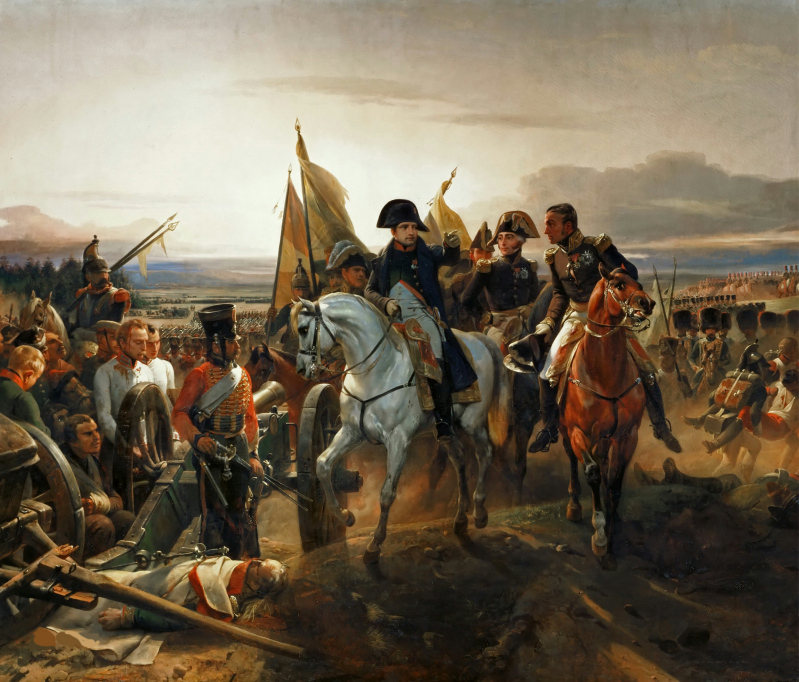
He argues that Bonaparte “bounced back from despair to overconfidence”, when reporting on the Battle of Arcola, with Napoleon proclaiming that the fall of Mantua “ought not to be delayed beyond fifteen days.” Mantua however never came under French control, with a surprise attack in mid-January advancing westward on Verona. Bonaparte lacked any scrutinization for his dishonest claims and would go on to pursue them. Barnett highlights that Napoleon’s deceptive manipulation in pursuit of loyalty from his soldiers is clear during his exercise of charismatic persuasion upon becoming the army’s general in chief. Barnett explains how Napoleon disciplined his soldiers not by the contemporary use of strict punishment, but by exploiting his young soldiers’ qualities of genuine patriotism and ideological fervour. Numerous methods included humble friendly chats and stirring personal addresses to each regiment. Barnett states that outstandingly successful method bonded the army tighter to himself and his fortunes, becoming loyal subjects of enforcing the commandments of the tyrant.

Barnett states that along with Napoleon being crowned the First Consul of France, the country experienced wide constitutional reform in the name of the “Code Civil” or the “Napoleonic code.” The reform proved to have great and lasting significance in achieving a suitable alternative for the outdated feudal legislation, establishing principles of equality before law and civil liberty despite being contained in a short document of 2,281 articles. The code was founded on the enlightenment idea that “a law based on common sense and equality should replace one based on custom, societal division, and the rule of kings. The legislation received deep praise for its “clarity and comprehensiveness” , being so great it organized the foundation for many European law systems and is largely in place to this day. Barnett, however, is critical to the extent that Napoleon was responsible for the creation and passing of the act.
He enforces the idea that he provided little to no influence on it. Barnett’s views are subject to mass scrutiny. This is as the historian may have possibly generated a highly critical view of the controversial figure purely for the purpose of publicity. The Telegraph declared that “Barnett’s zest for controversy brought him a public profile denied to most historians”, this might be shown through his failure to mention that the committee Napoleon appointed for the creation of the “Code Civil” met eighty times, with Napoleon presiding “over nearly half of these sessions”. His ruling was in good faith having “steadfast participation” and “vigorous support” of Napoleon as chairman. The code originally titled “Code Civil des Français” changed to “Code Napoléon” in 1807, as a monument for carrying “to completion the monumental legislative undertaking.” proving that Bonaparte did in fact provide great influence throughout the creation and ratification of the code in March 1804.
David Chandler
David Geoffrey Chandler is a British historian whose work is recognised as elite in the studies of Napoleon. The Telegraph states that Chandlers thorough dissection of Napoleon's battles is “unlikely to be improved upon, despite a legion of rivals” Chandler writes about Napoleon with deep admiration, siting him as “One of the greatest commanders of all time with Alexander the Great and Hannibal.” He cherishes Bonaparte’s life story stating that “If a historical novelist were to invent such a character, he would be accused of fantasy”, holding an overwhelmingly positive view of the emperor.
As opposed to Barnett who remarks Bonaparte as willing to exercise “domination over others”, Chandler shares optimistic regards towards Napoleon’s coup which led him to achieve the status of Frances de facto dictator. Chandler states Napoleons dictatorship was acceptable as it was only upheld due to the vast support of the people, being a clear mandate to rule. Chandler states Napoleons breaching of powers outweighs the previous governments “undermined authority” resulting from “administrative incompetence and financial weakness.” Chandler highlights this as a particularly “critical time” due to a new War of the Second Coalition braking out in 1799, with France facing against an alliance of coalition forces. Chandler sites that following Napoleon’s deadly descent on the council of five hundred and a successful coup, a new constitution was created placing him and two other Consuls in charge. Chandler then states that a once again re-written constitution placed “All real authority in the hands of the First Consul, Napoleon.”
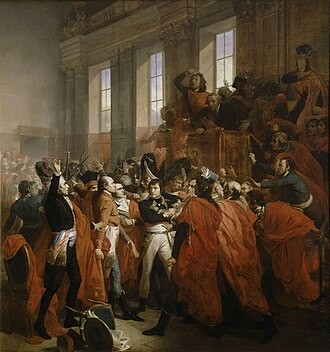
Chandler expresses this new constitution was subject to a vote, deriving the fact that Napoleons rule was not upheld due to his tyrannical means of oppression, but due to the consent of the people. He recalls the vote was held by a national plebiscite in February 1800, with three million in favour and fifteen hundred opposed. Napoleon now had a mandate from the people to govern, opposing Barnett’s view of Bonaparte acting as a “social misfit” of a tyrant, but now acting in the interests of the people.
Chandler however fails to mention that the extent of legitimacy within Bonaparte’s mandate to govern as a dictator (first consul) can be heavily disputed, as there is a questionable scope of how many people consented to his rule. The national plebiscite that voted on this new constitution consisted of around three million fifteen thousand people. This is greatly unproportionate as the population of France in 1800 was comprised of over twenty-six million. Several demographics were excluded, and in 1972 French historian Claude Langlois uncovered that the votes casting in favour of the constitution were greatly manipulated by Napoleon’s brother Lucien, who was also minister for the interior. In individual localities, Lucien added twenty thousand “yes” votes.
This demonstration echoes Barnett’s generalization of Napoleons deceptive nature, who completely opposes Chandler in saying that Napoleons exploitation of “an elaborate bureaucracy” fulfilled him to a purge the elected local government, making his impulsion “reach the tiniest cogs in his social machine”. Bonaparte was now regarded as a rightfully elected leader, meaning that no significant dispute could have arose to the validity of his powerful position. Nevertheless, it is worth noting that Chandlers view of Napoleon ruling only due to the people’s consent still holds validity, during his reign Napoleon “used the plebiscite on three occasions…to allow people ratify modifications of the constitution”. One instance being his coronation as emperor in 1804, with outcome of approval for the ceremony “never in doubt”. Napoleon was constantly under direct scrutinization, denying him to breach any powers that may seem tyrannical, acting in the best interests and will of the people. Nonetheless, the referendum of February 1800 did not consist of a secret ballot, paving the way for corruption, bribery or being pressured to vote in a certain way. The ability to take part in it was heavily constrained due to the strict criteria of property qualifications, leading to a regressive voting system not fully representative of the entire French electorate. However, one may say that such flaws in democracy would have been the standard in those contemporary times or even a vast improvement, therefore it would be unwise to judge his mandate to govern as other world leaders would have been voted in a similar style to acquire office. This argument shows Napoleon not as a tyrant, but as a figure who fairly acquired office through progressive means of the contemporary setting, establishing Bonaparte as having a legitimate mandate to govern for his country.
Pieter Geyl
Geyl’s book- Napoleon: For and Against is a barrage of how differing historians have contrasting attitudes towards the first consul. Geyl acknowledges such differing historical interpretations, and such, depicts Napoleon somewhat as a contradiction, siting him as a “Napoleonic Legend” and yet acknowledging his contribution towards the “disasters and final collapse” of the French empire. He considers Bonaparte’s restoration of order, alongside the “endless, bitter and bloody” campaigns that followed. In contrast to Barnett’s interpretation of Bonaparte as a deceptive narcissist hell bent on power, Geyl hails Napoleons genius and collective compassion towards all his allies in battle. Geyl notes that Bonaparte’s leadership made his soldiers become “accustomed to victories”, regardless of the gross underestimation from his colleagues during the early Italian campaign of 1796-97. It is true that during 1796 General Napoleon had a bold task of preparing his troops for battle in Northern Italy. His army’s primary strength declined from 106,000 men in 1792 to only 37,600 men with 60 guns in March 1796, all caused by widespread disease, desertion, and mass casualties.
All of these obstacles Napoleon proved to have overcome, as Geyl notes that as a reaction to Italy’s conquest “the kings grovelled before him”, providing a humbling experience to the elite. Napoleons thorough revival of the army was done by a swift disbanding of munitions battalions, recalling the cavalry from winter headquarters alongside a loan of 3 million Francs from the Genoese financiers. Napoleons compassionate pledge of his army’s diet being good bread and wine was fulfilled by adopting a genius strategy of dispersal over the countryside to feed themselves off the land, alongside protecting their fragile coastline against the naval raids of the British and Sardinian. Eventually, as the Venetian republic was split within Austrian and French forces, the campaign ended with a major success, with Geyl describing from Stendhal’s Vie de Napoleon the occupation of Venice as a “truly poetic and perfectly noble part of Napoleons life.” Geyl rightly points out Stendhal’s failure to highlight Bonaparte’s handing over of the Venetian Republic to Austria, being a practical “betrayal” through which he greatly debits the directorate and its baseness.
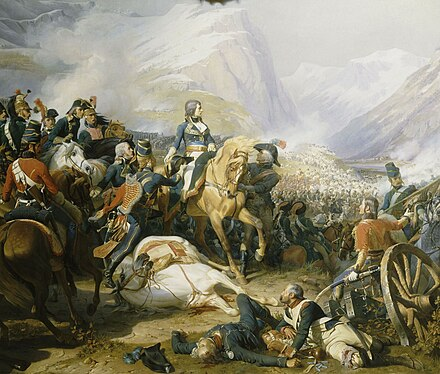
However, Geyl himself also fails to highlight Napoleons power hungry actions coupled with a self-interest desire during the Italy campaign, which of course Barnett greatly stresses as a major focus point of his historiography on the First consul. As worries emerged that Napoleon was exceeding in popularity, the Paris directory recommended that Bonaparte should split the command of the Italian army alongside the leadership of the greater experienced General Kellerman of the army of the Alps. Bonaparte was heavily reluctant to do so, even taking the aggressive leap of threatening to resign had that happened. Intimidated by his unwillingness to comply and his threats, the scheme was discarded by the directory.
Through works of several historians, Geyl mentions Napoleons use of the 1801 concordat, an agreement establishing the status of the Catholic Church during post-revolutionary France with the consent of Bonaparte and Pope Pius VII. Geyl evaluates the effectiveness of the agreement, questioning its extent of providing the Catholic Church a reasonable status halting a rebellion from other denominations, securing social order over the people, mirroring the judgement of Chandler, or parallel with the thoughts of Barnett, whether it was a tool Napoleon utilized to further pursue his supremacy over the country. Geyl uses Mignet’s work in stating that the Concordat was nothing more than Bonaparte’s plan to acquire absolute domination over the church for the sake of power “over the people.” Geyl states this occurs beside representative bodies being fatally “crippled and muzzled” due to the constraints on liberty Napoleon set for his “crazy dream of power.” Geyl’s viewpoint shares validity, it was no secret that the Catholic church supported the Bourbon dynasty which ruled France pre-revolution, this was bound to alarm Napoleon. Bonaparte, despite the Popes protests added 77 clauses to the concordat being named the “Organic articles”, greatly taming the document about to be enforced.
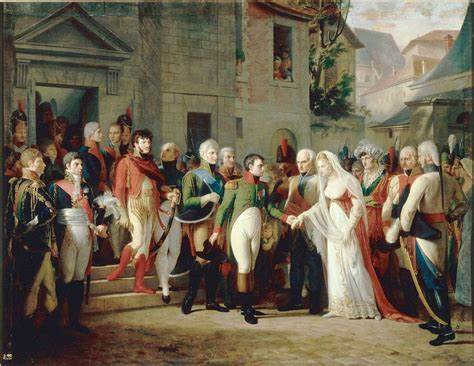
These articles imposed required approval from the government for a wide variety of ceremonies and policies. Policies such as the publishing of papal pronunciations, establishment of new parishes, chapels, and the summoning of councils. Articles 4 and 5 highlight why the measure acted in Geyl’s words as “no true liberation of the Church”, as it introduced the principle of heavy patronage by Napoleon, given now the ability to nominate prelates (a Bishop or other Christian figure of high ranking). Geyl argues through Quinet that Napoleons actions abolished the healthy separation of Church and state, leading to a “clergy enslaved by the sovereign”, coupled with a “despotic church in the power of a despot.” The provision of articles 6, 7 and 8 did mandate all bishops to swear an oath of loyalty towards the First Consuls government, providing a lack of scrutinization concerning Napoleon amongst the high-ranking figures of religion, further reflecting Barnett’s interpretation of him as an egotistical tyrant.
Geyl does however fail to mention the Concordat’s respect for individual freedom of religion as inspired from the post-revolutionary enlightenment ideals. The very first article of the document highlights the autonomy of Catholic practice, in a liberating and open way that does not infringe public order. The framework of the first articles took great inspiration from the 1789 Declaration of the Rights of Man, a French human rights civil document that guaranteed all men are created equal, have the undeniable access to safety, liberty, property and a resistance to oppression. Geyl’s writings about Bonaparte’s Concordat interconnect with Barnett’s generalization of Napoleon. Barnett regards the document merely an extension of his control, with religion treated as a power tool creating “social order.” He concludes this yet again the creation of another “bureaucratic engine” in the hands of a “political engineer” to further pursue his authority. Both interpretations are in great opposition to the overly optimistic one of Chandler’s, who regards him as great a statesman as he was a soldier when legislating the agreement. He describes Napoleon as “daringly” carrying out the Concordat in which Chandler regards as another addition to the “great set of reforms” in France.
Conclusion
Summarising the various interpretations, the works of Barnett and Geyl citing Bonaparte’s striking resemblances to Hitler are echoed in the fact that they both highlight Napoleon’s elevation throughout ranks of leadership as illegitimate. This enforces his ingenuine mandate to govern. Barnett states Napoleon’s reason for becoming First Consul was a “rude…confrontation” between him and the opposition deputies during the coup d’etat in the Orangery at St Cloud, in which he took over alongside two others, purely driven by the “mystique of fame and success”. During the coronation ceremony Napoleon took the crown from Pope Pious’s hands and placed it upon himself, explicitly showing that he is independent from the rule of the Catholic Church, validating Geyl’s words in which Napoleon “entered upon a struggle with the Church which he had first attempted to enslave”. Despite both regarding Bonaparte as a tyrant, as opposed to Geyl, Barnett doesn’t regard Napoleon a man who coupled his “lust of conquest” with “fine-sounding phrases of progress and civilisation”, but purely as a megalomaniac, hell bent on power at all costs. As well as criticizing Bonaparte’s extent of producing the Code Civil as stated before, he evaluates the content of the constitutional reform itself which Napoleon signed into law. Barnett scrutinizes the code due its regressive legislation towards females, as women were not allowed to buy, sell, or give away property without the permission of their husbands.
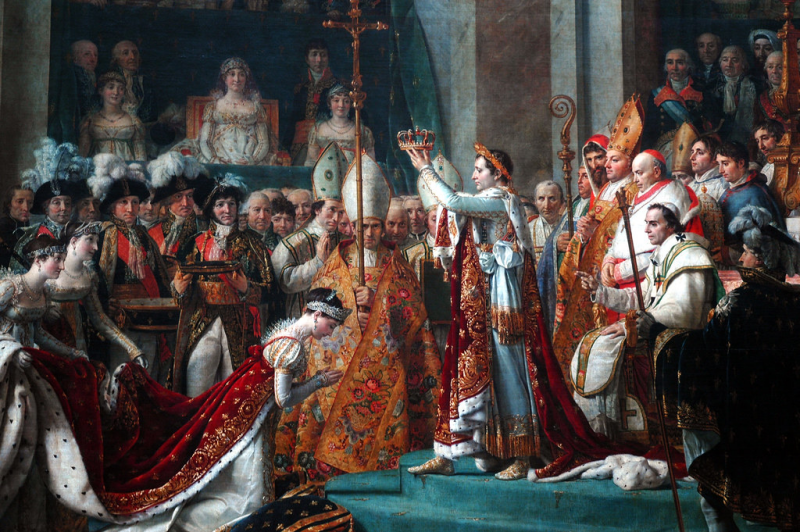
Barnett goes so far to say that the legislation where merely a reflection of his “low opinion of women.” Barnett also states that the act purely strengthened “the hand of state intervention in the private affairs of the citizen” ,expressing that during January 1800 Napoleon ordered mass closures of 60 out of 63 existing newspapers, with 9 only remaining by the end of the year and yet still under strict censorship. Barnett regards Napoleon as being “excessive sensitive to personal ridicule”, tasking his librarian in July 1801 for a weekly summary regarding the content of all publications, being books, journal’s, placards, and announcements, alongside even summaries of events in all educational institutions and societies. Barnett’s thirst for Bonaparte’s scrutinization may have overshadowed his ability to consider the long-term impacts of Napoleon.
Barnett fails to say that although frequently amended, the code still acts as a basis for France’s legislation, standing the test of time by being a living document, gradually progressing throughout France’s tumultuous history, adapting to the contemporary attitudes and times of the people, echoing positive remarks from Chandler.
Despite differing overall opinions, both Chandler and Geyl regard Napoleon as a fairy tale hero, whose life it would be hard to imagine had it not existed before. His ability to sway the masses through his ambitious romanticism conveyed the image of a sound leader- “Napoleon dazzled all who faced him, and particularly those who admired him without question.", therefore, it would be unwise to underestimate the extent of his genuine gratitude and commitment in improving the lives of his people. Whether, for the good, or bad, Napoleon served as a grand continuation of the enlightenment movement of classical liberalism. This is evident in his attempts to reform the church-state relationship, the very first article in the concordat emphasising freedom of religious expression as inspired by Jefferson and Payne. Bonaparte acted in a government that was derived from the consent of the people, as suggested by Locke’s social contract, enacting 3 separate national referendums to make Napoleons rule accountable.
The fact that democracy was in practice, no matter how considerable its flaws were, proved Napoleon’s plebiscites as great progressive policies during the contemporary period, rejecting the feudalist philosophy of the “divine right of kings”. Concluding the interpretations, despite Napoleon’s grand genius of battle planning, appeasement to the masses and vast social reform, Bonaparte’s excessive drive to achieve domination eclipses his duty to govern fairly as a non-tyrannical leader. From most to all of Napoleon’s actions and policies discussed in this essay, each of them, no matter how beneficial to the general public, had consisted of an agenda created by Napoleon, for the sake of Napoleon’s “massive boost to reputation, ego, and ability to rule.” Therefore, it is clear to say that Bonaparte, despite being arguably a good tyrant, enacting effective long-lasting change, still pursued authority illegitimately for his own self-interest regardless.
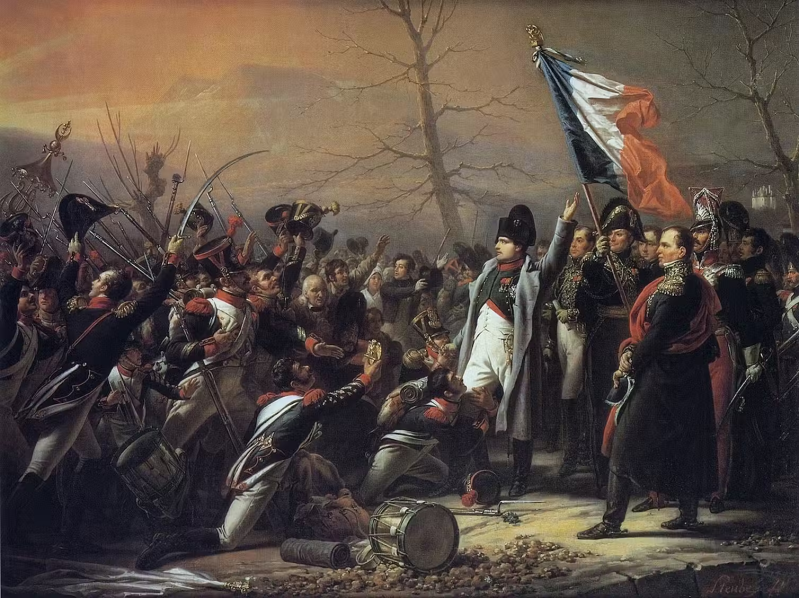
The might of the centre-right
how progress and patriotism can correlate for a thriving political party AND SOCIETY
REFLECTION AND REINVENTION, ALONGSIDE THE DANGERS OF STEAMING FACTIONALISM

Political parties are like Taylor Swift, if you don’t reinvent yourself for the better people will lose interest in you as you fade into irrelevancy. Close your eyes, take a breath, think about it. Despite (rightfully) getting trampled to 120 seats in the most recent election, the UK Conservative party is considered historically the most successful political party in Europe, and arguably the world, lasting since 1834 following Robert Peels decision to split off from the Tory party after the 1832 Great Reform act with the party continuing to the present day, although heavily battered due to bad governance coupled with steaming factionalism. How on Earth may such a phenomena be possible?- reflection and reinvention I say. Throughout history I can see that it is the paramount criteria for a flourishing political party. At the start I did make the correlation between Taylor Swift and successful political parties. Think about Swifts Eras-Fearless, Lover, Reputation, Folklore etc. Some reinventions (eras) greatly contrasted in tone with one another, such as the electro pop of Reputation in contrast with the mellow ballads of Folklore. Such reinventions proved to be an extreme success, given the fact that Swift may now enjoy the honour of being the top pop star in the current world.
Swift had the remarkable ability to reinvent herself yet remain true to her values. And so, throughout their 200-year history, the Conservative and Unionist party had the remarkable ability to reinvent themselves, yet remain true to their values.
Such progression made it possible for the birth of evolving ideologies fit for the contemporary world, being in correlation with the contemporary needs of the British people. For me, the beauty of politics lies not only within cautious progress and civil liberties, but also the need for accountability. This is exactly why; our Conservative Party is the most successful party in history. It has promoted cautious adaptation as opposed to reactionism, as seen by Robert Peels actions as the first Conservative Prime Minister. Peel abandoned his opposition to Catholic relief and split from the Tory party, forming the Conservatives, in which change was viewed as acceptable as long as it was cautious and stable. This was in tune with the narrative of Edmund Burkes “Change to conserve”, in which gradual reform was seen as crucial to avoid a society based on philosophical abstractions and a working class revolt, such as the recent French revolution in 1789, in which the event broke the social contract between the dead the living and those yet to be born, purging existing institutions, refusing to learn from the wise knowledge gathered from society’s constant process of trial and error. Following this, further ideological reinvention and reflection was proved evident in Benjamin Disraeli's one nation philosophy, stating in his book “Sybil” that the wealthy have a moral duty to provide a safety net for the poorest, enacting a fair playing ground for all, breeding a stable society. Following the failures of the Socialist post-war consensus which plunged Britain into being crowned the “sick man of Europe”, Margaret Thatcher broke off from the one nation tradition, inflicting a wave of the privatisation of key industries providing overall great increases to the standards of living, proved by numerous treasury reports. Thatcher had not actually identified as a classical Conservative, but rather naming herself a “Gladstonian Liberal”. The party had at times embraced British individualism coupled with compassionate liberalism as seen in the David Cameron era, during which economic austerity was in place following the largest deficit in the world left by the previous Labour government. Such fiscal toughness was present whilst the social liberal reform of same-sex marriage legislation was passed.
This is the beauty of the Conservative party, for she has most of the time sought to embrace the new whilst honouring the good of the old. Before the catastrophic results of the 2024 election, I was not afraid to speak against my own party, as I, like everyone should be, am the sovereign of my own thoughts, not factionalized into a grouping or narrative (e.g. One Nation or the ERG) but at ease with his own opinions. I called on the need to increase the thresholds of income tax to ease the cost of living for those least well of in society, whilst also calling out Liz Truss for filling her cabinet of purely her loyal subordinates. On LBC I called on the need to reform the UKs illiberal housing legislation, which proves itself to be a great strain on the availability and the prices of houses for our young people. Intense factionalism will only serve to do the Conservatives harm, as demonstrated by the party’s never-ending spiral of decline and destruction. A dip in the polls due to bad governance (as will be discussed later) leads towards steaming anger from backbench MPs, who are impatient of the executive (The PM and his cabinet) due to a genuine fear of losing their seat at the next election. Each MP now keep’s flocking like loyal subordinates to one’s leader of an ideological faction, pressuring the government to change direction. In extreme cases such events may lead towards mass resignations, coupled with the appointment of a Prime Minister not being elected by their very own party members, let alone the public, that be if the reward for backing a leadership contender is deemed satisfactory (e.g. a ministerial post).
Onto policy- Party gate , Boris’ misdemeanour of Pinchers appointment, Truss’ shambolic mini budget and Sunak’s weakness of leadership all proved paramount in providing a cruel summer for the former PM. The productivity problem also proves to be of crucial significance within the UK, displaying the flaws with the government's regulatory efficiency. Economic credibility is the bedrock of any successful party, and many would agree that Truss’ actions of extreme and swift tax cuts shattered the confidence of international investors, that be not helped by the sky high mortgages associated with the results of the budget. Many would argue that Sunak, following his term at the peak of the “greasy pole of promotion” could do no action to revert an election loss. I agree, however one may say that such electoral damage could have been greatly minimised. I don't know everything, but I think to be a good Prime Minister, you need to be a good reader, a good reader of the popular expectations of the people you so proudly govern, and it is clear Sunak in regards to those popular expectations of the people was either, blind, death or delusional, I say perhaps all three of those. You cannot be expected to govern effectively if your policies run in little to no correlation with the desperations of our people. Authority can only be derived by the consent of the people, who in democracy the people are the rightful dictators of a government’s destiny. Therefore, it seems, the will of the people was not replicated with the will of the former government. The people’s concerns lie within stagnant wages, towering illegal immigration, the quality of public services and an overarching tax burden, this is not correlated with the will of the former government considering a newly introduced smoking ban, further education reforms etc. It is now clearer than ever, that a leader’s hindrance of Locke’s theory of a “social contract’, will only serve to do more electoral harm than good.
Why do MPs in time of trouble flock and hide in their desired classification? ,unwilling and unable to seek and hear the ideas of others? One Nation or the ERG, Left or right, such overused terminology and groupings will only provide harm to any party in political turmoil as they provide the seeds of division that grow a splintering tree. I am not saying that all factionalism is bad, I am just saying that a successful leader should have a duty of cherry picking the ripest ideas from each faction, maintaining satisfaction of backbenchers alongside the British public, as they adapt their core ideology to be in correlation with the people’s desires. Cameron and Blair, the so called “modernizers” proved at times in exceeding in having such an ability, although Blair much more so than Cameron in my opinion. Cameron, in justifying his legalisation of gay marriage, stated that he passed the reform not “despite being a Conservative, but because of being a Conservative”, as he was merely just expanding and conserving the sacred institute of marriage. Cameron's fanatism of Tony Blair (notably naming himself the “heir to Blair”) also did considerable damage to his leadership I’d say, copying phrases, hand co-ordination and the style of speaking. Of course, it is crucial to take inspiration and ideas from your idols and opponents, however staying true to yourself also is an important feature of a class leader. When you pretend you’re someone you’re not, it is likely for you to come across as phony, fake and deceiving, instilling distrust amongst your colleagues. Although Brown originally came up with the statement, Blairs phrase of “tough on crime and the causes of crime” perfectly condenses the qualities of a sound leader which is evolving your party, yet remaining true to your values and who you are.
Once a leader has a firm grip on their own party, they may be daring and choose to enter unknown ideological territory attracting a crucial certain collective of individuals during a general election, the floating voter. Thatcher did this with her neo-liberalism of laissez-faire Capitalism although the majority of the party then bonded towards the One Nation ideology of a mixed economy. Thatcher was careful, justifying this was in perfect correlation with the Conservative ideology as she was just “rolling back the frontiers of the state” in the pursuit of returning “Britain to her former glory”. Blair justified his combination of centre-right economic policy and centre-left social policy on the premise that he has only ever hated one tradition of the Labour party- losing. This reinforced sympathy and support from party members and backbenchers, who were starting to question Blair as they perceived him to be drifting from the classical values of the party he governs. While writing this piece an event occurred that I think correlates with my points of view. The former home secretary rumoured heavily to be standing for the contest as leader of the Conservative party Suella Braverman made a speech in Washington heavily confronting her colleagues within the party who are pro LGBT. She says that the pride (progress flag) has been flown on government buildings as if signifying “occupied territory”, in which she accuses the colleagues of her own party being in favour of a “horrible political campaign” that leaves her “physically repulsed” due to the “mutilation of children”. Firstly, this is an extremely sensitive topic thus it cannot be talked about with such inflammatory and corrosive language, good leaders should always respect the opinions of others, this is how appreciation and unity is formed. Secondly, it is clear that Braverman’s thirst for factional dominance eclipses her duty to unify her party and the UK. True patriotism is caring for everyone in your nation, true Conservatism is not seeing them as LGBT, but as British.
A flourishing party is a team, we must care for each other and be guided by mutual decency, advancing the ripest of ides through reasoned debate in which it will act as a sift for the strongest policies. Such can be included in an election manifesto in presentation towards the electorate of a changed Conservative party. Time will also be a factor that cannot be underestimated in achieving electoral success, as forgiveness of the electorate may be narrow depending on a voter’s considerations of a party once they were in government. Such discontent in the past may endure a loss of the present election, as the electorate may fear that such immoral governance will repeat, or the voter may feel obliged to vote against said party as constant punishment due to the severity of damage caused during their term in power. This will depend on a leader’s ability to engage in the reflection and reinvention of said party. The extent of a successful political party will also depend on the party’s ability to consist of factions not working against each other, but together as a collective advancing policies that run most in correlation of the peoples demands and aspirations. Especially during such turbulent times, it is now no time for Members of Parliament to eclipse their visons of service with the visions of ministerial ranking which acts as a tool to satisfy their self-esteem. Advancement of reasoned thoughts is what I define as progress. Patriotism I define by one’s loyalty and commitment towards their nation, thus, there must be a new Conservative party that must be patriotic and progressive. Politicians must now disregard their climb upwards the “greasy pole of promotion” in Disraeli’s words, and serve out of many, as one party that will climb towards the pilgrimage to prosperity. This is the might of the centre-right.
an evening with the prime minister
A GREAT NIGHT WITH GREAT PEOPLE
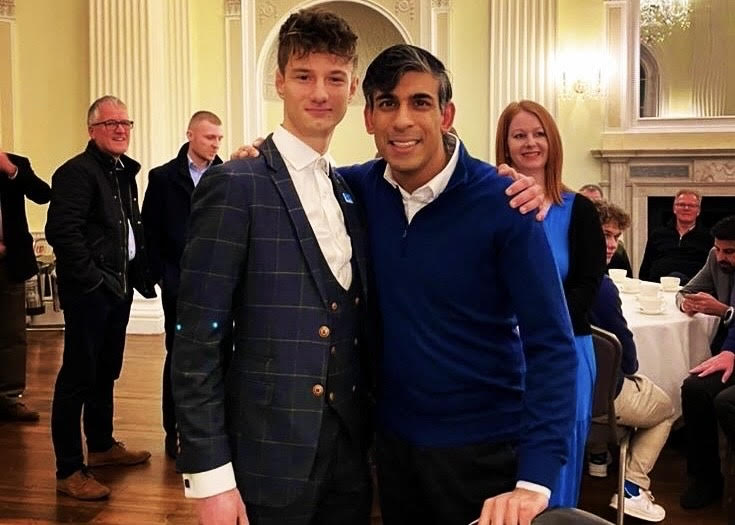
Looking at it now, the 3 hour train journey from Bradford to Huddersfield to Manchester to Buxton certainly proved itself worthy for this enchanting evening. Upon receiving an invitation via email, it never explicitly stated meeting Rishi, but a "senior member of the cabinet" at the Buxton Crescent Hotel. I was suspecting the special guest to be Foreign Secretary David Cameron but he had a meeting in Kosovo therefore it couldn't be him, nevertheless I was not disappointed. During my train journey, my suspicions arose that it could be Rishi, given the fact that on the same day Lee Anderson MP posted him and the Prime Minister visiting a school in his constituency. On Google Maps I looked up Lee's constituency and it's distance from the Buxton hotel, it wasn't very far at all. My train to Manchester was actually delayed by 10 minutes, however I only had 11 minutes to change. By some miracle I arrived at Manchester 5 minutes before the train to Buxton.
Brodie kindly waited for me at the train station with the hotel being only a 5 minutes walk. Approaching the arched structure, we noticed several large Range Rovers. Me and Brodie traversed around the setting with no senior cabinet member in sight. We approached the venue with great delight, never being in such an exquisite setting. After some ID inspection, we were welcomed upstairs towards the assembly room.
Barely any people were present due to us being very early, nevertheless, this did not stop me from introducing myself to the very few people who were there, and of course I gave everyone my awesome business card. I asked one person if he had any idea who this special guest may be, he said it was the PM as he asked the receptionist downstairs. As more people started to enter, we all gradually began taking our seats. Someone asking me if I ever myself wanted to be Prime Minister, I replied with a large chuckle and stated "I want to be someone who makes a large contribution towards the wellbeing of the British people'. Malaika joined us as we were all awaiting for the special guest. At conference I gave out my business cards to and conversed with tons of senior cabinet ministers. This was my chance now to take on the top dog, it was about to get real.




The boss (Rishi) entered in a blue quarter zip and some slippers, he started to converse with the people closest to him beside the door as he traversed around every table, taking time to talk to everyone, which was very kind of him and I greatly appreciated it. He started to approach us shaking each of our own hands, I introduced myself saying something along the lines of "Hello Rishi, I'm Sebastian and I am the Chairman of the Leeds Young Conservatives,' I reached from my breast pocket presenting him my business card, "This is a little gift from me to you" He accepted it with great pleasure saying something along the lines of 'Oh wow! that is great!, Rightwingking?," He noticed some other of my cards on the table I previously gave, he questioned "Oh, you also have one of those, ey?" Rishi noticed the old liberty torch Conservative party logo on the card remarking it looked like a chicken. He asked me from the card "is that a URL?', for which I replied with "Yes Rishi, I make a website highlighting my political opinions and experiences, you have been a great experience, so ill include you!" Rishi replied with a great laugh with me, Brodie and Malaika all taking a photo with him.
After talking to everyone, Rishi gave a brief speech highlighting opportunity of the individual, coupled with the mention of the Rwanda plan for illegal immigrants alongside hyping us all up for the this years local and most importantly, general election. Edwina Currie who happened to be health secretary under Margaret Thatcher (Pictured on the second photo on the left with Rishi) was also present. Rishi soon departed and the crowd slowly but surely started to disperse. Me, Brodie, Malaika and Nadim all decided to go downstairs for a drink.
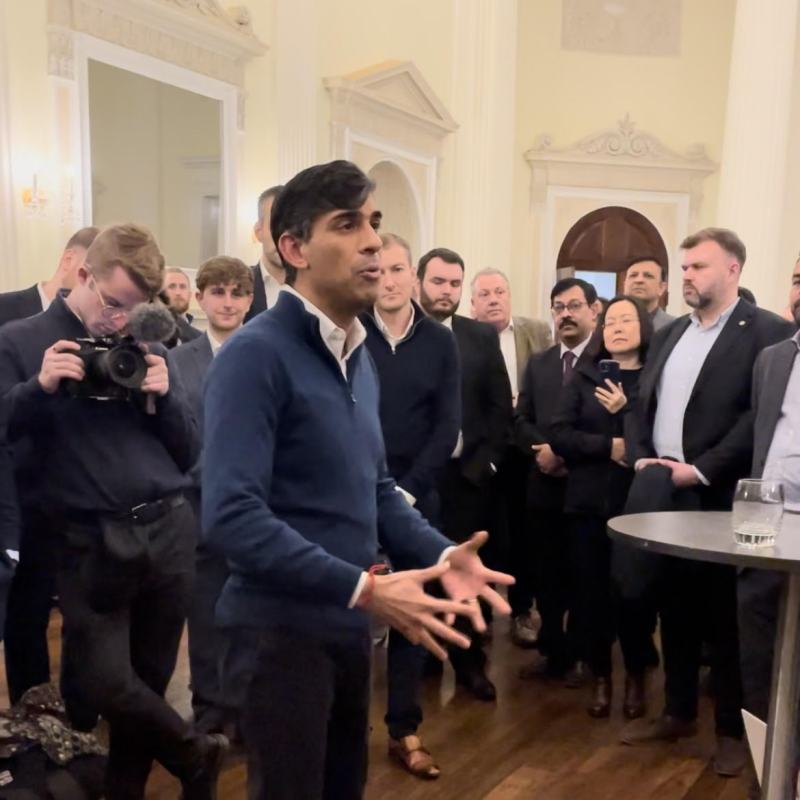
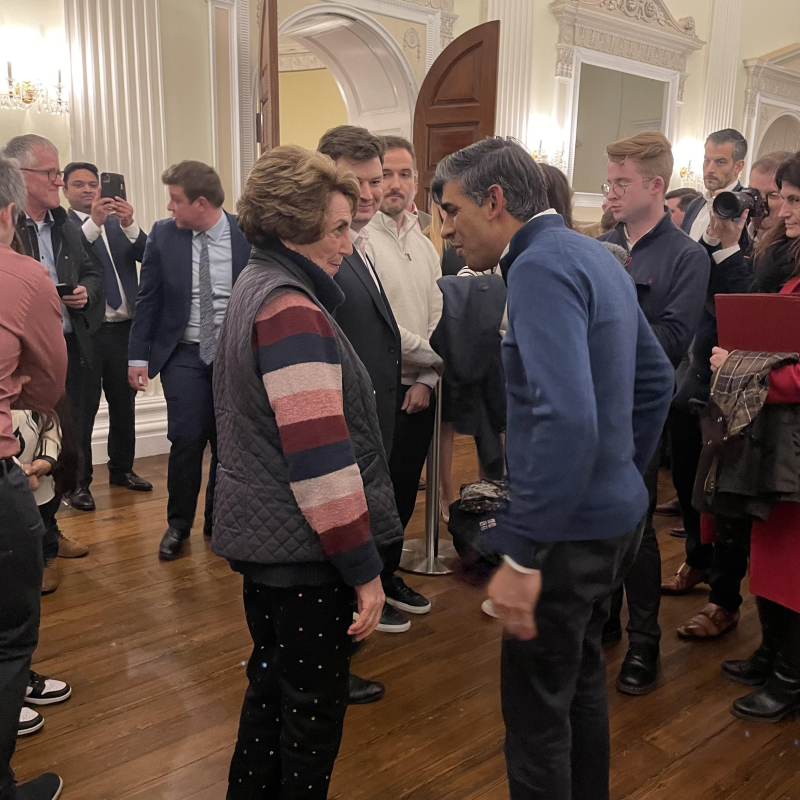


I got lemonade, we all sat down in the room pictured top right, discussing all sorts of Prime Ministers, policy, and parliament. One thing that I found funny is that upon sending my photo to mother of me she asked if my drink in the photo were champagne or white wine, for which I replied lemonade. We were discussing with Brodie whether to get the late or early train, as we decided for the late train, there was loads of time to kill therefore we went upstairs to certainly the fanciest restaurant I have ever been. Initially I ordered the mussels, however upon hearing that there's none left, I chose the pigeon.
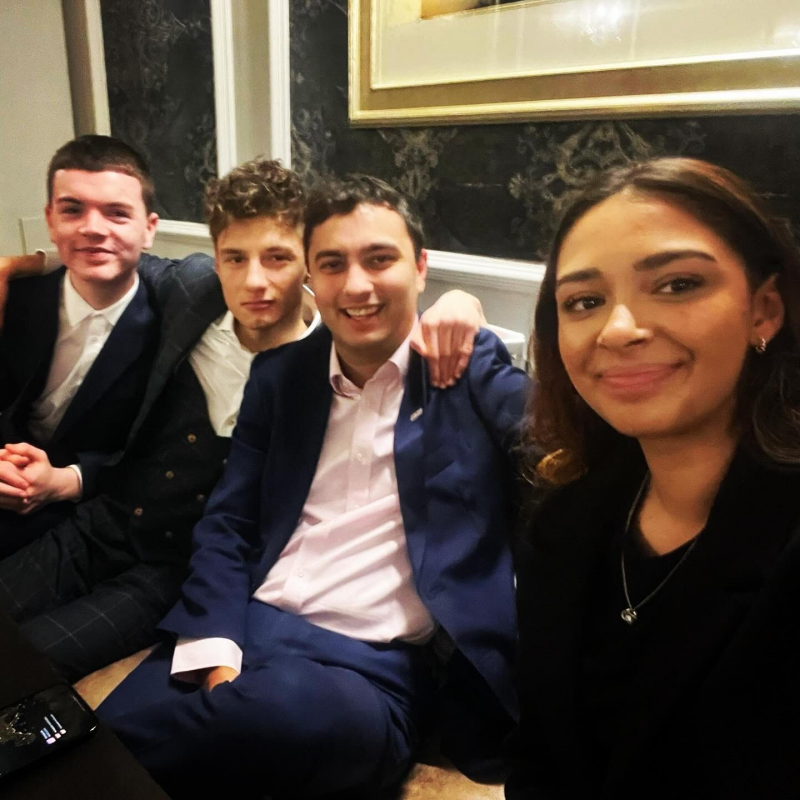

Before the main meal we were presented with complementary bread and butter. I know you'll think I'm weird for stressing how good bread was, but this was certainly the best bread I ever had in my life. So fluffy, textured and delicate. It was heaven. The pigeon was equally as great. Another journey awaited for me going from Buxton to Manchester Piccadilly to Victoria to Bradford. I posted the photo of me and the PM on Twitter which managed to receive a bit of attraction, nevertheless this was an enchanting evening, coupled with great people alongside a fantastic spirit of kindness, compassion and ambition. If you see this Mr Prime Minister I'd be forever grateful if you'd call me and invite me to No10, let's get Britain thriving.
special thanks to: Malaika, Brodie, james and Nadim!
The Conservative Party Conference 2023!
MY EXPERIENCE WITH THE FORMER PM, CABINET MEMBERS AND A DEEP INSIGHT IN THE CRUEL SUMMER OF UK POLITICS!

Wow what an absolute sesh this was, all split within four days with each of them containing thrilling experiences, parties, people and a robust insight in the Cruel Summer of the divisive and chaotic nature of our contemporary world of British politics. Not every day do you get to meet the Former Home, education and business secretaries, the current Home Secretary, former Prime Minister, Defence Secretary, Nigel Farage, the Leader of the House of Commons, and the Chairman of The Conservative party alongside his deputy. Meeting a vast array of exciting individuals, old and young, good people, sound people, people whose ambition is coupled with compassion, I can safely say that the future of the Conservative party is bright!
Day One
Before Conference, I made an insta group chat from TikTok of everyone who I knew would be coming, on day one we all met alongside Ryan, Heather and James. We all traversed around the main hall taking photos in news stands and displays which was lively fun. My first fringe event was the "First time at Conference-young Conservatives breakfast" , this included a speech from Matt Vickers MP and soon after the event broke up into an open conversation with me attempting to talk to as many as possible as I discretely gave my business cards to everyone. I gave out so many of my cards with everyone accepting them, one person even noticed this and remarked that I would make a fantastic salesman haha.



Following this, me and others attended main hall speeches from Party Chairman Greg Hands, Foreign Secretary James Cleverly and Defence Secretary Grant Shapps. In the main hall I talked to deputy chairman of the party Lee Anderson MP and said how both of our families come from working class backgrounds proving you can acquire a noble position no matter your upbringing. We took selfies with Cleverley and Shapps as well.
After a great lunch of a spicy chorizo pizza, I attended the meet the minister Q&A with Andrew Bowie MP (Parliamentary under-Secretary for energy) I told him that the last nuclear power station fully built was in 1989 and approved by Margaret Thatcher stating that they do take decades to build and so I asked him what is the Governments progress with nuclear energy.


At the end of the event, the Secretary of Defence Grant Shapps appeared willing to answer a few questions. Unfortunately, he didn't answer my question. I was going to ask if his appointment as Defence Secretary was completely based on his thorough loyalty to Rishi Sunak. Following this I attended a gala drinks reception in which I saw the Health and Social Care Secretary Steve Barclay.
I had to cut my presence in the gala drinks reception short. I waked into my hotel taking more business cards and changing into a tuxedo to attend The Conservative Democratic Organisations black tie dinner party, a grouping that was created for a stronger voice of the party grassroots members as a result of Sunak becoming Prime Minister with no membership vote. Upon entering, I was greeted with lovely glass of white whine and traversed slowly around the venue. I gave Darren Grimes (A GB news reporter) my business card.
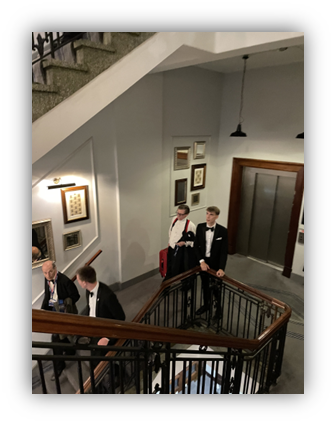


As I greeted Priti Patel, (the Home Secretary under Boris Johnson) Priti let out great cheers of excitement which led me to believe she recognised me 5 months ago from Bournemouth when I met her. Priti was wonderful to talk to and a delight as always. The meals included: for the Starter Pressed Cheshire Ham, for the main course roast Cumbrian Chicken with a butternut squash risotto and for dessert Lemon posset, burnt meringue and lime curd, all of them great meals. An auction followed which included a personalised message from Boris Johnson on a bottle of wine, an internship at CMC markets, Golf with Lord Cruddas and countless other prizes. Alongside other youths of the Tory party, we hit the dancefloor joining Patrick Christys from the GB news team, Priti noticed us and gave great signs of applause with a big smile. The awesome Sweet Caroline was the final performed song of the day, with me and Bailey being the last men left dancing relishing this great moment.
Day two
This day was by far the most action packed. Morning kicked off with me attending the Young Conservatives breakfast with Faye Jone MP, my favourite part being the jars of yogurt and granola. We had a debate on Putin and Ukraine. The infamous news station The Guardian interviewed me, asking if I am proud to be a young Conservative. I answered yes explaining how my Labour controlled Bradford Council prevented a 20 million investment from a private investor due to him saying the council was responsible for a "lack of regeneration". I also stated the councils CEO earns a salary greater than the Prime Minister which is unacceptable. The Guardian however did me dirty however, the video they posted shows how I said something like "yes and actually my father came from Poland with only one suitcase and £100 and I want more stories like that" Now this may seem I call for unlimited immigration making me a hypocrite for being a Tory, however they cut out all of what I said before and cut out that I said that my father adopted pure Conservative policies of hard work, deciding your own destiny and spending your own earned income however it suited him to end up having an excellent job, life and family. He also came in here perfectly legally. People viewing the video had a deep misunderstanding of what I said. All of my Conservative Colleagues and even senior figures of the party who heard my story have agreed with me.
Soon after I attended the "Future leaders: careers in politics" event. This was super boring and useless as they said everything I already knew like "stand up for yourself" and "be resilient and get involved". I went to the British growth rally which had speeches from Truss, Rees-Mogg and Patel. As I joined very late, I had to wait outside for a while as the room was absolutely packed.

I only got to hear the final speech and soon after Truss was exiting the room along with a barrage of security guards and a swarming crowd after her. I proclaimed towards her "I know your nephew!". This obviously grabbed her attention, in the middle of a vast crowd she stopped and turned her head towards me, she asked "Oh really, who's that?" I answered "Nathanial" for which she enthusiastically replied "Oh, Natty!" Following this I mentioned how he voted for me in my schools mock election, in which I emerged victorious. Truss asked me about my future plans, I stated how I would've picked Oxbridge for university if it actually did the course I wished to do (Politics and international relations). I said that if I am going to do something, I would like to put my all my effort into it thus I said how I would like to got to University College London (UCL) next year for Politics and IR. Truss said that I should now sign up Natty for politics in which I replied with a warm laugh. Thinking about it now, during our conversation I should have asked for a better photo than this but oh well, regardless I am in her Twitter banner (look it up!)
After Truss' conundrum we attended main hall speeches from the Chancellor of the Exchequer Jeremy Hunt alongside a speech from the Food and Rural Affairs Minister Therese Coffee. I sat right at the front and giggled whenever the camera was on me haha, even got a few glimpses at Rishi who sat on the same row as me. The New Conservatives event was back to chaos again, although not that crazy as the growth rally. The room was absolutely packed and the event included Members of Parliament proposing policies of lowering tax, immigration and making sure parents have a right to oversee their children's sex education in schools.

"Coming into this county not knowing the language or culture well and then raising a successful family with a great job is one of the most beautiful and conservative things you can do”- Jacob Rees-Mogg


We had a Q&A with Stuart Andrew MP (minister for Sport Tourism and Civil Society). During the event, he addressed a poll stating that if a general election was to be held right now, only 1% of 18- 24 year olds would vote Tory. I told him that as a YC, I am determined to make a Leeds young Conservatives association and asked him on any advice. At the end of this event, I was approached by Paul Homes MP who gave me very thorough help and advice on starting a YC group, yes, he's the one who's arguing on Twitter with Nadine Dorries ;)
The only event I had planned for the rest of the day was drinks with the leader of the House of Commons, Penny Mordaunt at 10:30, there was lots of time to kill. I met former education and defence secretary Gavin Williamson and gave him my card. I shook the hand of arguably the most influential man in British politics over the last few decades, Nigel Farage, where he told me "Its so great there's so much youth involved!". I conversed with the Home Secretary, Suella Braverman. From my lanyard she saw that my MP was Philip Davies for Shipley, she said that he is doing a great job.
I told Suella that both of our parents come from foreign countries and that it just highlights that with the right mindset and determination, you can be someone of a worthy position no matter your background. Whilst my friends and I were hanging out in a hotel restaurant, we saw Jacob Rees-Mogg. I congratulated him on his earlier speech stating that I am the son of 2 Polish people. We had a great chat with Jacob-Rees Mogg about the great effects of legal immigrants who are willing to work hard and provide the best for this country. Of course I gave him my business card ;)



During our time waiting beside the door for drinks with Penny Mordaunt, we spotted Theresa May in the lift, I also shook hands with the Defence Secretary Grant Shapps. The time finally came and at 10:30 we were let into a small cramped room where it was getting properly humid. I met the president of this years conference Peter Smallwood, what a nice guy. I believe security realised that the room was simply too small and cramped for everyone so they moved us into another room. Security stopped us for a while as Rishi was walking down the stairs towards the lift. I was one of the first people in the new, thankfully air conditioned, larger venue. I went immediately towards Penny and asked for a photo. I knew that Penny previously ran in two leadership contests to be PM, so soon after I told her that "third times the charm' in which she responded with great laughter. Her speech was complimented with roaring cheer and applause, stating that her feelings were absolutely mutual. I started a chant which everyone followed of PENNY! PENNY! PENNY!

dAY THREE
Another day, another Young Conservatives breakfast. This day was a lot more laid back as I essentially met everyone I already wanted to. After a breakfast at the YC theatre we proceeded to the main hall to hear a few speeches from a few cabinet members. Health Secretary Steve Barclay spoke alongside levelling up minister Michael Gove. Gove's speech was definitely one of my favorite, he spoke with clear passion with strong voice and enthusiasm.

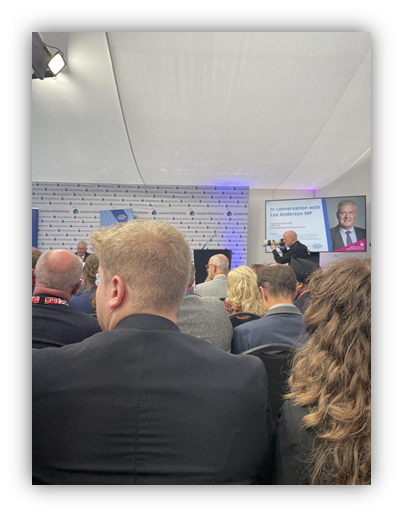
We were planning to attend a Q&A session with the Chancellor of the Exchequer Jeremy Hunt MP however the que was so long so we didn't bother. I gave out more business cards whilst waiting for an in conversation session with Lee Anderson MP (deputy Chairman of the Conservative Party) . In the session, Lee Debunked the myth that he said people can survive on only 30p per day. In reality he was given a challenge of using 10 pounds to pay for a weeks worth of meals. Around 200 meals were made with one meal being divided into the equivalent of 30p. Just shows that with the right mindset you can create a sustainable living and that the media is the enemy of the people!
Lee also talked about how way more coal mines were throttled under the Labour governments of Callaghan and Wilson than Thatcher's. He stated how the loyalty of the working class towards the Conservative party arose as a result of Thatcher's right to buy scheme. Because people now could buy their own council houses, individuals now had a legacy of a house and property to pass on to their sons and daughters once they passed away. There was a debate about HS2,with Lee strongly opposing the project, a teacher told him that HS2 was to free up track to get from Bradford to Leeds quicker. Lee looked around the crowd and asked "Is anyone from Bradford here?" I raised my hand. He looked at me and asked "would you like to get to Leeds quicker?" I responded with shaking my head and mass laughter followed. "That will be on the front page on the Guardian tomorrow" he replied. One news story on Twitter twisted this story and said only that Lee asked "Any one here from Bradford?, would you like to get there quicker?" They cut out the part when he asked about travelling to Leeds from Bradford as a result of freed up track from HS2. Just highlights the negative hypocrisy of the media.
At 18:00 we all attended the young Conservatives drinks reception, having both surprise speeches and appearances from the party Chairman Greg Hands and former cabinet minister Jacob Rees-Mogg. Jacob remarked that through the ideas of the great Margaret Thatcher as Conservatives we are obliged to take pride in owning a house. He asked "How many people here want to buy a house at 30?" We all raised our hands of course. Someone even shouted out "Younger!"

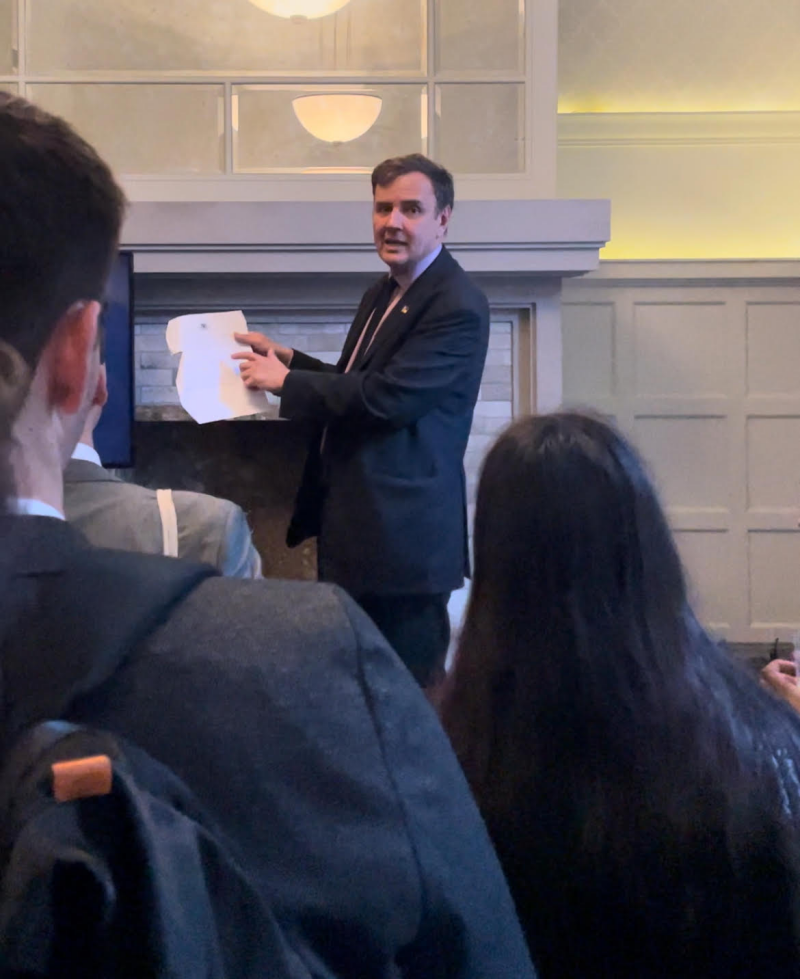
Greg Hands remarked in his speech that conference is in its highest attendance in a decade, we all cheered and roared boisterously with our glasses of champagne. Of course Greg isn't Greg without his infamous "there is no money left" note, a note previously uncovered by the Conservative-Liberal Democrat coalition of David Cameron left by the Labour government of Gordon Brown in 2010. As Greg was about to leave, I quickly walked towards him in aim of giving him my business card, exclaiming something along the lines of "On here there's my blog of my political activities were I share my great experiences, you have been a fantastic experience so I will include you!" He accepted my gift with great pleasure.


Last night of Conference Party! What a great way this was to wrap up the last evening of this dazzling event. As I walked in, I had an awesome glass of champagne with the first song being Voulez Vous by ABBA, having a great sesh with Ryan and Bailey during the very early minutes of the party. Gradually others started to arrive and so did more champagne. I recorded a video with Tyler regarding him as my good old "Tory boy", in which he stated that I'm doing a great job at promoting the Conservative party, saying that I'm "Getting us in power'. I replied with-
"Exactly, getting us in power, to empower YOU to make the right decisions for this country and for the PEOPLE!"

I took a selfie with the London assembly member Andrew Boff (he was the one who heckled Suella Braverman for transphobia during her speech) After giving out more business cards, some spillages I stood up on a stool and addressed the young crowd- "In a few decades time, we are all going to be in the cabinet! However this is going to be an entirely new system because you're not going to be Home Secretary and you're not going to be Foreign Secretary and you're not going to be Education Secretary, we all, at the same time, will have the POSITION OF PRIME MINISTER!!" Mass roaring, heckling and support followed. When the song "Hot N Cold" by Katy Perry started playing I funnily remarked that this song is about Sir Flip Flop Kier Starmer, as he has broken every single political pledge of his. I left at 50 minutes past midnight.
Day Four
I've woken up very early for this day as I knew that the que for Rishi's speech would be massive. During my two hour que, I had my interview with Sky News in which I criticized the HS2 train project and called for shorter, easier transport link. I criticized both of our most recent Prime Ministers Rishi Sunak and Liz Truss for various reasons, you can find the interview on my TikTok page (@Rightwingking_). We received massive cardboard banners with one side being the Tory logo and the other being the conferences slogan- "Long term decisions for a brighter future"
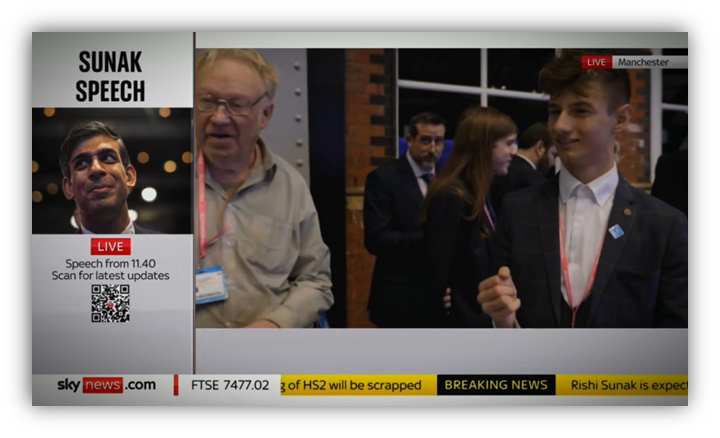
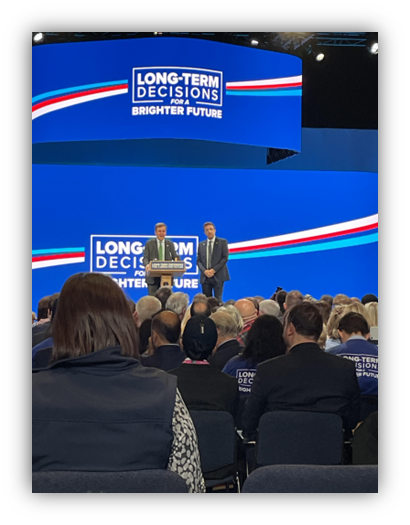
Speeches were made from the Leader of the House of Commons Penny Mordaunt, minister for Veterans' affairs Johnny Mercer, Rishi Sunak's wife and then the Prime Minister himself. Penny's speech to me was very prime ministerial, she traversed around the lectern siting back her memories from Portsmouth as the was ships rode off to the Falkland Islands to defeat Argentina. She remarked that as one of the key examples to stand up to bullies and recalled Margaret Thatcher stating "Conference...we are not for returning" Her speech was concluded with mass praise and cheers, with me screaming "Penny we love you!" Johnny Mercer's speech had a fun joke, he started his speech saying " Yes, I am also surprised they gave me this slot to speak" which was received with great laughter. Akshata Murthy, Rishi Sunak's wife also spoke. Her speech wasn't scheduled in the information at all which was surprising. Akshata remarked that Rishi is one of the hardest working men she knows.
Rishi's speech was extremely long, being round about 1 hour and 50 minutes. He talked about all sorts of issues, from not cutting tax immediately, saying a man is a man, lifting the smoking age by one year every year, to scrapping a levels and HS2. The cancellation of HS2 received a thriving amount of applause compared to the previous statements in his speech. My favourite thing he said from the speech was that we right now have a vastly diverse cabinet, with a lot of the secretaries parents not being British at all and himself being the first British Asian Prime Minister. The outstanding thing was that he said "And its not a big deal at all"
All of us gathered after the main hall sharing our opinions on the speech, we all varied in terms of optimism. The news platform 'News Agents' approached us and interviewed us all on several key topics including Rishi's speech, low Tory youth support and HS2 etc. I stated that that pure Liberal-Conservative policies have the potential to be very attractive for our youth, creating your own destiny, freedom of enterprise, spending your own earned money however you like etc. I spotted Dr Luke Evans MP and told him that Rishi needs to appoint him as health secretary, he responded with a good laugh but he said he was worried if he had enough experience.


Greg Hands approached us all thanking us and giving a few words of encouragement for the battle of the next general election. Me, Nathan and others agreed that we are keeping our Conservative banners no matter if they want to take them away, we simply loved them too much. As soon as we got out of the secure zone the police told us to remove our lanyards so protestors don't heckle us. Little did they know we were carrying massive Tory banners as the one displayed in the Dr Luke Evans photo haha. As we traversed through the crowd of protestors, we experienced all sorts of shouting, heckling and roaring. As the protestors heckled, I blew them a kiss. Me alongside 20 other Tory youths finished the day in Wetherspoons discussing political policies, plans and whether or not Sunak has a chance at winning the next general election. The banner of the Conservative party conference still reigns high and proud on my cabinet, reminding me everyday my experiences of great people, parties and being a powerful precedent guiding us on our political journey.
Special thanks for making conference so great! to:james,Rafael,molly,Ryan,Heather,Jess,Nathan,Anna,Tyler,Jacob,Malaika,bailey, rhys,Ally,Benny,Sami,Brodie and joe
Do the results of elections express the will of the people?
MY ENTRY FOR OXFORD'S JOHN LOCKE ESSAY COMPETITION

The will of the people is a fundamental doctrine in John Locke’s Liberal philosophy of the social contract. A state only exercises and enforces decrees due to the consent of the people governed. The Oxford Dictionary states the term, “will” as a noun meaning “the faculty by which a person decides on and initiates action”. As everyday citizens, we are deprived of time and/or simply do not have an interest in dictating all the actions and measures that we ourselves are governed by. Consequently, we designate political representatives through elections to order decisions on our behalf, hoping they are exercising legislation correlating to our desires and intentions, the will of the people. In this essay I use 3 characteristics to evaluate and elaborate how far elections disclose the will of the people: A) The electoral systems used to elect members of parliament, B) The quantity and quality of the candidates up for election and C) The standard of information voters consume when casting their choice.
The Electoral Systems used to elect lawmakers
Points of reasoning to reform our system of electing politicians has been noteworthy in the contemporary politics of the United Kingdom. The argument is that Britain’s current electoral system “First Past the Post” (a plurality-based system where the party elected with the most MPs out of 650 wins, with each MP representing a constituency) is not sufficient in allocating the proportion of seats correlated to the votes of the UK electorate, thus of course not representing the will of the people as lawmakers are elected on a mandate to deliver their pledges. Clear examples of this issue are highlighted in the general election of 2015, the UK independence party (UKIP) secured a vote share of 12.6% and only receiving one seat in the commons. Had the seats been allocated proportionately from the peoples votes, UKIP would’ve won 82 seats, had this happened, the political landscape of the UK would’ve shifted dramatically and only then the will of the people would have been truly represented.
UK General Election of February 1974

A more significant example can be presented in the UK general election of February 1974. In a period of sincere economic stagnation, countless strikes and a failure to secure a deal with the UK coal miners’ union led by Joe Gormley, the Conservative government of Edward Heath called a general election founded on the slogan “Who runs this country?”- was it the unions or the elected government? Heath addressed the country on television-“Do you want a strong Government which has clear authority for the future to take decisions which will be needed? Do you want Parliament and the elected Government to continue to fight strenuously against inflation? Only you can stop it. It's time for you to speak—with your vote. It's time for your voice to be heard—the voice of the moderate and reasonable people of Britain: the voice of the majority…we've had enough. There's a lot to be done. For heaven's sake, let's get on with it.”

The election resulted in Heath receiving the greatest proportion of votes, 11,872,180 (37.9%) and yet Wilson with a lower vote share of 37.2% under the FPTP system won the premiership, as he had 301 seats in the commons compared to Heaths 297. In this concurrent setting, the will of the people of a “strong government” and one who will “fight strenuously against inflation” has been shrugged off, with a government in power that does not correlate the terms of Locke’s social contract, proving the results of elections do not express the will of the people. Nonetheless, this statement is open to evaluation as Steve Double, Conservative MP, argues that “First-past-the-post has consistently produced majority governments that can govern. It is easy to understand and allows a direct link between an MP and their constituency.” Yes, it is true the United Kingdom has faced remarkably less coalition governments over its history unlike its western counterparts like Germany and Italy, with the only recent coalition governments being: Conservative-LibDem (2015), Conservative-Labour war cabinet (1945) and the National Alliance (1931). Locke in his book of political philosophy (Two Treatises of Government,1690) makes the case that we humans consist of a positive state of nature, with us each of us consisting of a natural desire to seek our own happiness and interests with a rational mindset. Surely then, wouldn’t the rational thing be a call for “majority governments that can govern”?
The quantity and quality of the candidates up for election
A customary routine for the masses during election season is casting a vote for “the lesser of two evils”. This principle signifies an aim for the least harmful and unethical figurehead possible to be elected to office, despite the public not being satisfied with the elected candidate as they are still branded as “evil”. Surely then, we the people do not have our will expressed in elections as we have of no logic or reason in selecting such a destructive individual. Perhaps if a wide variety of candidates was available, those of which each had an equal chance to victory and those who consisted of contrasting visions were available, then the people would elect a representative that corelated with and expressed the will of the people?
The 2016 USA presidential election acts as a fine example for this ethic. Analysing the election, American social studies teacher Matthew Beat stated-“So, it was Donald Trump versus Hillary Clinton, two of the most unpopular presidential candidates in American history.”-This is true, Trump was a highly rejected figure, throughout the Republican primary debates he consistently used insults to attack his opponents and was branded simply as a clown who was unfit for office, the situation got so inadequate that Trumps competitors for president in the Republican party even formed a mutual “Never Trump” coalition. Hilary Clinton also faced an abhorrent attitude from the public, due to many factors such as the 2016 Clinton email scandal and during her time as Secretary of State occurrence of the 2012 Benghazi Attack scandal.
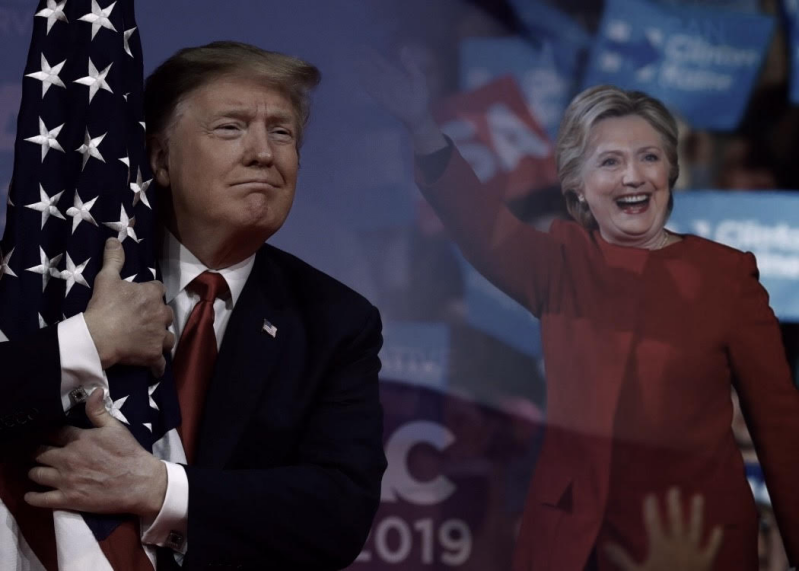
Had the US government undertook more precautions, the death of four Americans, including Ambassador Christopher Stevens, could have been easily avoided. - “One poll found that 60% of Americans didn't like either candidate so this was the perfect opportunity for third party candidates”. So, was this the perfect opportunity for third party candidates? Absolutely. Did any of them succeed yet had any chance of succeeding? No. Why is that do you say?
I defend the idea it is due to the dominance of a 2-party system. This complex is in place and will remain in place as the network works in equal favour of both the democratic and Republican parties. The Commission on Presidential Debates established in 1987 (by both Dems and Reps) only once admitted a third-party candidate into a televised debate, this case being Independent Ross Perot in 1992. Likewise, in 1988 the League of Women Voters withdrew its support from the bipartisan commission, arguing they purposefully filled the debating rooms with supporters, predetermined question selection, room temperature etc. All those policies coupled are bound to de incentivise millions from voting, is there an alternative solution to the enhancement of the will of the people by producing an increase in voter turnout?


Yes, one resolution is to make voting mandatory by law. The countries of Australia and Uruguay adopted this regulation, experiencing turnouts in the last elections of 89.74% and 90.13%. Nevertheless, by adopting this policy, could it not be argued that the state is abusing its power as it is overregulating the peoples influence, due to the only purpose of the state, according to Locke, is to protect “The peace, safety and public good of the people”. And even then, a high voter turnout may not be expression of the will of the people, they may still decide to select the least harmful candidate, “The lesser of 2 evils”-
Ezra Taft Benson, former secretary of Agriculture under President Eisenhower, remarked "If you vote for the lesser of two evils you are still voting for evil…You should always vote for the best possible candidate, whether they have a chance of winning or not. Then, even if the worst possible candidate wins, the Lord will bless our nation more because more people were willing to stand up for what is right."
The standard of information voters consume when casting their choice
“There is no such thing as “unbiased” news.”- Hunter S. Thompson, American author. “Apart from things like box scores, race results, and stock market tabulations, there is no such thing as Objective Journalism. The phrase itself is a pompous contradiction in terms”. The media we view everyday has and does exercise its great ability of persuading one to follow their beliefs, or support their cause, morphing and transfiguring into what people think may be their will, but in reality, harms them and the governance of the world, making the results of election, not representative of the true will of the people. All counterparts of the political spectrum, in hope of being elected as the nation’s figure head, possess and utilize the ability of exploitation and perversion of broadcasts, newspapers, publishments, announcements etc. On the left of the political sphere,-“Look what we did, we [CNN] got Trump out. I am 100% going to say it, and I 100% believe that if it wasn’t for CNN, I don’t know that Trump would have got voted out…It’s going to be our [CNN’s] focus. Like our focus was to get Trump out of office, right?”-CNN’s Technical Director Charlie Chester. - “[Trump’s] hand was shaking or whatever, I think. We brought in so many medical people to tell a story that was all speculation — that he was neurologically damaged, and he was losing it.”
A news network like CNN with such global respect, “so many medical people” and massive viewership is bound to signal to the masses that this information is reliable, and can be trusted, and so, masks itself as the false identity disguised as merely an “expression of the will of the people”, promoting the fact that elections are not an expression of the peoples authentic true will. The opposite correlates on the right of the governmental landscape as well, the publication of Williams’s and Obrien’s “Global Political Economy” states that posts were distributed with the key intention to suppress voter turnout for Trumps Democratic rival, Hilary Clinton, one source being the Russian troll farm- “Internet Research Agency”. Methods included misdirecting voters to non-existent polling stations, encouragement to vote for third parties and suppression of the black American vote who typically vote Democratic. It is evident that this is not a left or right issue, it is an issue of government surveillance, dominance and control, masking and generating a false construct drawing on persuasion.
I discussed the notion that the results of elections could only express the will of the people purely if these elections are perfectly susceptible to certain factors. These include a fair and representative electoral system, a great variety of candidates with contrasting views to ensure freedom of choice and unbiased, perfect information to ensure voters have their will truly conveyed. Given the fact that achieving all 3 of those ambitious components at the same time in terms of possibility would be rare to none in the current world due to previously explained factors of corruption, dominance and unwillingness to change and progress, leads me to defend the characteristic that the results of political elections for the majority of time, throughout history, are in fact, not a satisfactory expression of the will of the people.
My full experience at the Conservative Democratic Organisation black tie DINNER party
WHO I TALKED TO,WHAT I DID, AND HOW YOU CAN COME NEXT TIME...

Before attending I had no doubt that I would certainly be by far the youngest individual there, and I was right. Luckily, I have to say my age did not give me any feelings of alienation or worry as these slight worries were quickly forgotten. The black-tie party’s official starting time was 7:30,countless others and I arrived in Bournemouth (the location of the event) a few minutes later. As we were traversing towards the entrance, Purbeck Hall of the Bournemouth international centre, we were accompanied by roughly a dozen of protesters besides the door waving numerous banners, saying chants like “Say it loud, say it clear, refugees are welcome here!”.
I found they’re tomfooleries very ironic considering now the fact net migration is at one of the highest levels ever. Walking past them I showed them happily the signature Winston Churchill peace sign and blew them a kiss. We got our tickets checked and each person had a number next to our names on the securities clipboard which they would say to us. This meant the table we sat as each table had a display of a number, mine was 13. I think this was a very good action as it avoided hassle of who sits where. Upon entering Purbeck hall itself I was in a very pleasant surprise. The large hall contained rows of pristine organised tables with little flags of the union jack on each one and a bowl of ice and water containing bottles of red and white wine. Light blue light flooded the scene. At this early time, hardly anyone was sat, and people were talking next to the bar. One person stated to me “I didn’t even bother coming to the morning and afternoon conference, I just came here!”. Soon after I spoke to Lord Cruddas, the president of the CDO and showed him my TikTok account, I told him how my politics teacher nicknamed todays chancellor Jeremy “Corbyn” Hunt.
I spotted the former home secretary under Boris Johnson, Priti Patel. She was in a sparkling pink dress conversing with other people. I came up to her stating in a very soft tone something along the lines of “As a very young Conservative, I would just like to say thank you for your duty as home secretary and I greatly appreciate what you have done”. She let out a great smile replied with a long, heart-warming “awwww, thank you!”. We shook hands. It was clear that she was very heavily moved by my compliment. She acted towards me in an extremely kind, sweet and comforting way. Shortly after, we sat down at our tables, there were 9 people on each one. I was seated with very quality and generous folk, an old couple from London, a member of the royal navy, a middle-aged couple, an old lady, and a relatively young woman with a kind 80-year-old man who was her uncle.


We all stood up to sign our national anthem, with Andrea Jenkins MP, who was a former opera singer, singing on the stage. I have to say hearing opera in reality than on TV is incomparably better. Our starter was Harissa Lamb Bun ball-this was lamb meat covered in fried breadcrumbs, underneath mashed potatoes, spinach and carrots. This was a very good starter, and the warm lamb complemented the taste of the cold carrots well. I had fantastic conversations with the people on my table, they asked me numerous questions like where I come from, am I with anyone, how did I find about this event. I said that I come from the areas of Leeds-Bradford and that I am probably the youngest person here and that I came here alone. I stated that my father came to this country 17 years ago with just one suitcase and only £100,and now he has a fabulous job,house,family and life. I recited quotes of Margaret Thatcher, told them my ambition to become a member of parliament and that I have this some sort of unusual but good feeling of a natural duty to care, lead and protect. I stated in detail my vision for this land where a true Conservative government will uphold its great principles of personal liberty, freedom of expression and freedom of enterprise, along with other political thoughts and campaigning in the bad weather experiences of mine. The people on the table seemed to be beyond impressed by my political knowledge and greatly complemented me which I certainly did not take for granted and greatly appreciated. The old lady from London told me that she has 3 very successful children. This is due to teaching them discipline, resilience and hard work. She stated that to me that she sees high success in me and that in the political life I will go very,very,very far. This was truly a moment of massive joy for me.
I genuinely had tears in my eyes, and thanked her a lot. They started saying to themselves to remember my name and said they hope to be alive when I will become noticeable in the future. We also made fun and talked excrement of the tofu eating Guardian reading woke mob which was certainly a fun highlight. Behind where I was sat stood Dan Wootton (former executive editor of The Sun newspaper and now a major GB news channel host). He was talking with around 2 other people. The kind London lady told me to get up and speak to them. I hesitated for around 2 minutes but then I stood up and introduced myself initiating a good handshake with him and surrounding people. One man beside him mentioned that I am only 17 years of age and Dan Wootton said something along the lines of “Only seventeen! woah!”. It seemed that he was in total disbelief that a person like me would take the effort to come here. He stated to his friend beside him “He is going to be Prime Minister or a cabinet member!”, I let out a big genuine smile and thanked him lot. As he is one of GB news’s most senior presenters, he asked me if I may have watched the channel sometimes. I replied with yes and due to me knowing that my local MP (Philip Davies for Shipley) often appears on the channel with his wife (Esther McVey for Tatton), I asked him if he knows them. He responded with a large sigh of “Oh yes!” and then I told him that in the local elections I campaigned with him and that he gave me access to parliamentary work experience in his Westminster office. The main course was an oven roasted breast of Chicken with sweet vegetables and a rectangle of potatoes. I sincerely enjoyed it. Desert I would say was magnificent not only aesthetically, but also in taste. The desert was a caramelised white chocolate dome with dark chocolate and orange ganache.

Starter

Main Course

Dessert
It was time to dance. I happened to be dancing with a group of around 7 20-year-old young conservative campaigners from London. Jacob Rees-Moggs sister, Annunziata was also dancing. There was this one member of the young Conservative London campaign team who I danced with excessively, his name was Cameron, and we had an awesome time dancing passionately to songs. Few song examples being “I want to dance with somebody” by Whitney Houston. And “Don’t stop me now” by Queen. The finalists of Britain’s Got Talent 2020 “Soldiers of Swing” sang for most of this event. Soon after everyone was a tiny bit more tired, and the auction began. Up for grabs were Arsenal Season tickets, a week’s internship at CMC markets, “an exclusive lot for every true Thatcherite” etc. The nice London lady on my table won the Thatcherite set. There was some more dancing with us waving the flags of the union jack we had from our table on the dance floor. The party was beginning to end, and more and more people were leaving. A lot of people complimented on my dance moves and on my suit, which had velvet lapels and a rose boutonniere.


I met the CEO of the Conservative Democratic Organisation and told me to contact her through her news profile, “The Conservative Post”. The 80-year-old that sat beside me gave me great lessons on how to ski and we practiced a lot of movements together. Now there was only around 10 left of us. We went outside with someone randomly talking about the global warming world cycle. We all said goodbye to each other, and I was the last one waiting outside the closed doors for my father to pick me up.
The reason I found out about this event was through an email from the CDO, as I did join this group (for free) as it was created after Rishi Sunak became PM. I booked tickets for it and conveniently some of my family lived nearby. You didn’t even have to be a member of the organisation to go to the event, all you had to do was book tickets. The event was also advertised on their Twitter and other social media. You essentially just have to look deeply through the internet to go to something like this. Overall, this was an outstanding. pristine event in which I have made unforgettable memories, danced in my tuxedo like some rich aristocrat, and was surrounded by awesome, compassionate people who share my vision of improving Great Britain for the better, for the good.

JerEmy "Corbyn" hunt's commie budget means utter shambles for the uk economy
BIG GOVERNMENT HAS BECOME THE OPIUM OF TODAYS "CONSERVATIVE PARTY"-YOU,THE BRITISH PEOPLE,DESERVE BETTER.

“Madam Deputy speaker in the face of enormous challenges I report today on a British economy which is proving the doubters wrong! We took difficult decisions to deliver stability and sound money. Since mid-October 10-year guilt rates have fallen, debt servicing costs are down, mortgage rates are lower, and inflation has peaked. Today the office for Budget responsibility forecasts that because of changing international factors and the measures I take; the UK will not now enter a technical recession this year!” Following Chancellors Jeremy Hunts opening budget statement, the typical roaring and heckling of Tory backbenchers followed, desperate to alienate support for the finance minister. Do not let this optimistic image of the countries supposed rate of progress deceive you. The same organisation that served as a source for the Chancellors positive remarks (OBR) states ordinary households will feel the pinch more than at any point since 1957, a figure not to be proud of, this country is very far from economic prosperity and tough challenges do lie ahead.
Despite the criticism, anger and revolt, Hunt still went on with a major controversial policy. Jeremy Hunt announced in the commons that corporation tax will indeed increase from 19 to 25 per cent. Corporation tax receipts as a share of the economy will rise to their highest level since the tax was introduced in 1965. “Raising corporation tax will be a disaster,” says the former Tory leader Sir Iain Duncan Smith. “You cannot go ladling extra taxes on what is already the highest tax base that we've ever had. We've already seen businesses leaving the UK, we cannot then give them another kick as they go out the door, that would just be the end for us.” Low corporation tax acts as an incentive for businesses, big or small, to invest in the country. In return, the country receives escalations in employment, income and prosperity. Enacting a rise in business tax, gives a clear inverse effect of hardship and failure.
A humiliating example of this is evident when the vaccine company Astra Zeneca sought to construct a new drug factory worth over 320 million pounds close to its current locations in northwest England, but Sir Pascal Soriot, the firm's chief executive, claimed that Dublin was instead chosen because "the tax rate was discouraging." It is worth noting Irelands corporation tax stands at a far more attractive and competitive rate of 12.5%. A possible evaluation point to my criticism of the budget is that the full rate the corporation tax increase is only paid by 10% of all companies and under the new full expensing scheme companies can receive 25p for every pound they invest, nevertheless, that is only talking about the increase, the overall government tax (combined with banks) is still ridiculously high. The country has faced recently a massive decrease in economic freedom with the UK dropping onto the 28th place in its index. The well renounced and well-known index of economic freedom did state “The size and scope of the state have expanded dramatically since 2020, and significant reforms are needed to place the economy on a solid path of recovery. Restoring the soundness of public finances remains the most critical issue and will require a sustained commitment to downsizing government spending.”
Former PM Margaret Thatcher proudly stated in her book -“Already large and unwieldy after its expansion in two world wars, the British Government very soon jammed a finger in every pie. It levied high rates of tax on work, enterprise, consumption, and wealth transfer. It planned development at every level…It managed the economy, macro-economically by Keynesian (leftist) methods of fiscal manipulation…It nationalised industries, either directly by taking ownership, or indirectly by using its powers of regulation to constrain the decisions of private management in the direction the Government wanted.” Indirect nationalization is occurring right now, due to the massive regulation of liberty (one of many examples being the UK facing the highest tax burden in 70 years, the highest spending in 50 years and numerous arguments stated before above.) I believe politicians of today enforce leftist high tax, high spend policies, to benefit themselves, their firms and their colleagues in the ranks above.
This is due to the fact that these Socialist enactments absolutely crush small and medium businesses, leaving no competition and leaving only big businesses, as they are the ones who already have a well-established reputation. The image of a country should not be devised by the government but should be devised by the extraordinary individual citizens of Great Britain, in other words, you. You should dictate your own future, you should decide how you spend your money, you should be able to map out your destiny, you should not be subject to the intimidation of strangling policies of a of gang of rapacious cowards in the upper ranks, Margaret Thatcher, a fighter for individual freedom and Liberty, is in disgust viewing today’s actions of the party she once led, and so am I.
Who will be the next president of the USA?

AMERICA! The land of the free and the home of the brave, or so they say. The race to the highest office in the land has officially started. From extravagant radicals with a cult-like following to mediocre moderates who nobody likes, this race consists of intriguing individuals who are up for the keys to the Whitehouse. Let’s look at the most likely candidates.
Donald Trump
“America's comeback starts right now…I tonight am announcing my candidacy for president of the United States!” The preposterous former president is clearly the dominant figure in being the Republican party’s nomination. Trump leads in Republican polls by 56%, followed by Florida governor Ron DeSantis with 25%. Trump to this day receives backlash for supposedly inciting the January 6th capitol storming, however this does not seem to startle the politician in any way, it is clear he wants the presidency and wants it desperately. During his first campaign event on March 25 in Waco, Texas, in a speech centred on personal grievances and legal difficulties, former President Donald Trump referred to the 2024 presidential race as "the final battle”. He said, “If we don’t win this election in 2024, I truly believe our country is doomed,”
Ron DeSantis
Having turned Florida from a swing state to a Republican gubernatorial landslide, people believe Ron DeSantis has the same ability to have this effect on the entire country, thus winning the presidency. "I think what it takes is to have a vision for the country, have the ability to exercise leadership and being willing to stand in that fire when it gets really hot and not back down under pressure," he said. There seems to be civil war brewing in the Republican party, Trump and DeSantis have clashed recently with Trump exclaiming that its very unlikely he will pick him as vice president and nicknaming him “Ron DeSanctimonious”. DeSantis has officially announced his run for president through a Twitter live event alongside Elon Musk.
Nikki Haley
American politician Nikki Haley presided as South Carolina's Republican governor from 2011 to 2017. For two years, she served as the 29th ambassador of the United States to the UN. Haley has officially announced her 2024 bid-"Now is not the time to hold back. Now is the time for a strong and proud America," she tweeted, linking to a campaign video. Ms Haley is the third Indian American to seek a presidential nomination, very tough challenges do lie ahead of her.
Joe Biden
Despite being the oldest President in history of the USA, falling asleep at the most serious of times, mispronouncing the simplest words and forgetting the most basic things, President Biden has stated frequently that he intends to compete for re-election. He is yet to make a formal announcement, however. Recently, in a white house ceremony, Biden quipped about how "some people are born to run" while praising rock music icon Bruce Springsteen, teasing a 2024 bid. Biden does lead the Democratic party’s primary polls with him at 37.8% followed by Kamala Harris at 21.5%.
Kamala Harris
In spite of polling indicating Vice President Harris as the key Democratic rival for Biden, Harris did proclaim that Biden is not too old for presidency, and she does intend to run with him in 2024. Nevertheless, growing reports do indicate that President Joe Biden is in fact frustrated with Kamala Harris because she hasn't "risen to the occasion" and hasn't taken on more responsibility because she's worried about failing. Could this lead to Biden selecting a new vice president in 2024 and Harris rebelling by running for the presidency herself? These individuals had some clashes in the 2020 Democratic primary debates, and an event like this is possible to mirror itself all over again.
Gavin Newsom
“Yeah, he’s definitely running for president,” said Dan Schnur, a politics professor at the University of California, Berkeley, who did act as an advisor to Republican candidates. “The only question is whether he’s running in 2024 or 2028.” Democratic Florida governor Gavin Newsom multiple times has denied the claims that he will run for president due to his California recall election in 2021, nevertheless, almost every politician who has dabbled in chief executive ambitions has a history of denial. “Newsom is setting a course for higher office, after his tenure as governor,” said Sonja Diaz, director of UCLA’s Latino Policy and Politics Institute.
Hilary Clinton
Yep, you read that right, the former first lady and the Democratic contender for the presidency over 7 years ago might give it a shot once again. Who knows, maybe 2024 will be a rematch of 2016? A former advisor to Bill Clinton has speculated that Hillary Clinton may have plans to run for president in 2024. The former secretary of state may run for president a third time, positioning herself as a more "moderate" alternative to Joe Biden. He further commented "Once Biden pulls out, the polling will show that the Democrats are leaning toward some crazy radical like Gavin Newson, Bernie Sanders. Maybe even Alexandria Ocasio-Cortez herself…I see more and more signs that Hillary’s going to run."
No, Rishi Sunak is not a self-proclaimed "Modern Thatcherite"
a look on spending and taxation through their budgets

“I will run the economy like Margaret Thatcher if I win...we will cut taxes and we will do it responsibly,” Rishi Sunak stated when campaigning to be PM. “That’s my economic approach. I would describe it as common-sense Thatcherism. I believe that’s what she would have done.” Mr Sunak before you became Prime Minister you assumed the position of Chancellor of The Exchequer since February 2020, and I have to say Mr Sunak, looking back at your work, you are no Margaret Thatcher. Mr Sunak vowed that tax cuts can only proceed once the country has tackled inflation "I want to get a grip of inflation because inflation is what makes everybody poorer...once we've done that, I will deliver tax cuts." This totally contradicts Margaret Thatcher's actions. Thatcher became Prime Minister in 1979, with a crippling inflation rate of 17.24%. In the same year her annual budget announced bold tax cuts. The standard rate of tax was cut from 33% down to 30%. The top rate of income tax was reduced from 83% down to 60%.
A common counterpoint to this action is that VAT from this budget increased from 8% to 16%. However, the zero rate on food and other basics remained unchanged, also Thatcher did state "Income tax cuts were vital, even if they had to be paid for by raising VAT in this large leap". In the 2021 budget, the then chancellor Sunak announced that corporation tax – which businesses pay on their profits – will go up from 19 per cent to 25 per cent in 2023.This was an immense change in tax policy – the first time a UK chancellor has raised the headline rate of corporation tax in decades. Mr Sunak said in his speech: “Even after this change the United Kingdom will still have the lowest corporation tax rate in the G7". This statement is very misleading. The organisation for economic development (OECD) stated in 2019 that UK banks in 2023 will have the highest corporation tax rate, higher than all the countries in the G7 with a figure of 33%. Sunak increasing corporation tax just adds fuel to the fire caused by the banks of the United Kingdom in crushing enterprise incentives for small businesses and competitiveness, as they are the ones who have to face higher risk-taking decisions than already well established business giants who have a solid reputation. There is absolutely no way Thatcher would approve of this policy in an annual budget if she was PM at this time. Margaret Thatcher's second budget, announced on the 26th of March 1980,gave a special focus on aid for small businesses through the enacted "Enterprise zones". These were areas, typically 500 acres in size, within which major tax incentives were made available to business's-100% capital allowances for industrial and commercial buildings, complete relief from development land tax, exemption from local taxation, drastically simplified planning control and lighter regulation.
Let us face the obvious fact now-The United Kingdom tax burden is at a 70 year high, the highest number since the second world war(Yes, even higher than the Socialist Government of Clement Attlee!). Of course by reading the information above, you may have already come to the conclusion of what would Thatcher think about this far-left policy. I want to delve deeper however, and debunk counter points that some people use to push the silly narrative of Sunak somehow being a "Modern Thatcherite". One advisor of Margaret Thatcher (Patrick Minford) did notably state "It is true that in the 1981 budget taxes were raised by not indexing income tax thresholds to inflation. But marginal tax rates were not raised; there was no rise in NICs or in corporation tax such as Mr Sunak has proposed. It is also true that in 1981 fiscal policy was tightened sharply to combat inflation. But the circumstances were quite different from today. There was no independent Bank of England with an inflation target so the fear was that the government would print money to finance its deficit. Today, money printing is in the Bank’s hands. In fact these days, keeping NICs and corporation tax down boosts supply, which helps reduce inflation as the Bank tightens monetary conditions."
We will now move on to government spending, and analyse the very contrasting actions of our two main figures. Thatcher enacted cuts in government spending. The Public Expenditure paper of 1980-1981 highlighted a £3.5 billion reduction in the Labour party's proposals and were denounced as "draconian". The Iron Lady did not give in, and boldly stated that the cut "really was not large enough". She pursed and continued in her mission to decrease the public sector and increase the size and capacity of the private sector, as the private sector is in simple words, better. Better as a treasury study found that real prices after a decade of Thatcher's privatisation had fallen 50% for telecommunications and industrial gas, and 25% for residential gas and electricity. William Megginson in his book "The financial economics of privatisation" argues that in spite of those drastic price decreases, quality of those services did improve. The nation rejoiced. As of the present day, the nation suffers. Government spending as of right now is in its highest rate in over 50 years time. The government of the United Kingdom's total managed expenditure as a share of gross domestic product was 44.6% in 2021/22, compared with 51.6% in 2020/21. How on Earth is the private sector meant to flourish, to provide the best service possible for the British people, when this barbaric policy keeps competitiveness chained to the ground?
I would like to finish with a statement from the magnificent book-"Margaret Thatcher-The Downing Street Years". -"Almost every post-war Tory victory had been won on slogans such as 'Britain Strong and Free' or 'Set the People Free. But in the fine print of policy, and especially in government, the Tory Party merely pitched camp in the long march to the left. It never tried seriously to reverse it. Privatization? The Carlisle State Pubs were sold off. Taxation? Regulation? Subsidies? If these were cut down at the start of a Tory government, they gradually crept up again as its life ebbed away. The result of this style of accommodationist politics, as my colleague Keith Joseph complained, was that post-war politics became a 'socialist ratchet' - Labour moved Britain towards more statism; the Tories stood pat; and the next Labour Government moved the country a little further left. The Tories loosened the corset of socialism; they never removed it." I believe we are experiencing a significant reflection of history as of right now, I believe we are experiencing the so called "Conservative party and its PM" failing to learn from and acknowledge the mistakes of the past, and falling to enact the policies that turned this nation from "The sick man of Europe" and "The British disease" into "The British cure". Rishi Sunak and his party have not learned this lesson yet, and thus they are learning it through civil unrest, strikes and agony of the British people.
By Sebastian Gradzki Jr
Sources: Total managed expenditure as a share of gross domestic product in the United Kingdom from 1981/82 to 2024/25-Statista, Fact Check: how competitive is the UK after Rishi Sunak’s corporation tax hike?-Channel 4,No Rishi, Mrs Thatcher would not have raised taxes to a 70-year high-The Telegraph, Margaret Thatcher's Privatisation Legacy By Chris Edwards and Margaret Thatcher: The Downing Street years


Create Your Own Website With Webador